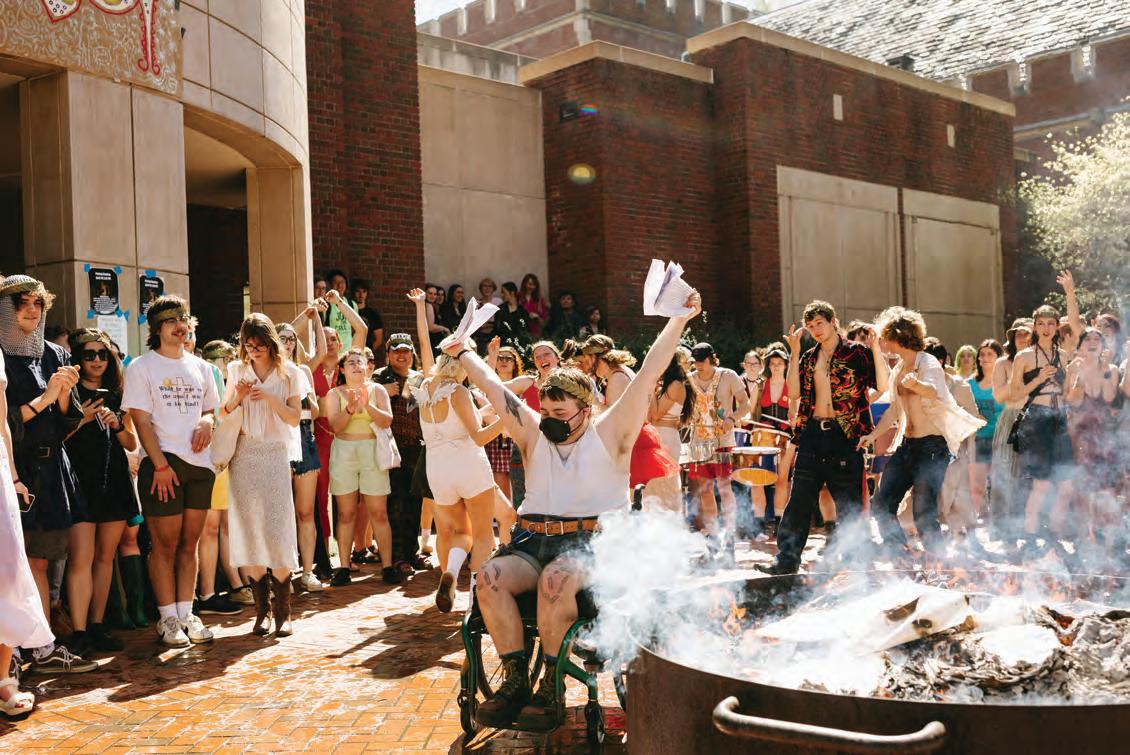‰
TIME AND PLACE
Prof. David Schiff’s musical journey winds through the vineyard with Susan Sokol-Blosser ’67 and around the track with Steve Prefontaine.


Prof. David Schiff’s musical journey winds through the vineyard with Susan Sokol-Blosser ’67 and around the track with Steve Prefontaine.

Your steadfast service to the college and the alumni community is a gift. Reed deeply appreciates your time and many talents, and it is an honor and a pleasure to work with you. Thank you.
Alumni Board
alea adigweme ’06 PAST PRESIDENT
Michael Axley ’89 ALUMNI TRUSTEE
David Baxter ’87 PRESIDENT
Carla Beam ’76 ALUMNI TRUSTEE
Sirius Bonner ’05
Grant Burgess ’13
Maya Campbell ’15
Jennifer Delfino ’05
Ian Fisher ’07
Carmen García Durazo ’11
Liz Gilkey ’01
Katie Halloran ’15
Ashlin Hatch ’17
Avigail Hurvitz-Prinz ’05
Valentina Jin-Trowbridge ’11
Gray Karpel ’08
Christine Lewis ’07 ALUMNI TRUSTEE
Eve Lyons ’95
Peter Miller ’06
Govind Nair ’83
Laura Nelson ’13
Haley Parra-Cain ’17
Dylan Rivera ’95 VICE PRESIDENT
Lisa Saldana ’94 ALUMNI TRUSTEE
Laramie Silber ’13
Marjorie Skinner ’01
Andrei Stephens ’08 SECRETARY
Alumni Fundraising for Reed Steering Committee
Keith Allen ’83
David Buckler ’85
Doug Fenner ’ 71
Jay Hubert ’66
Advait Jukar ’11
Kyndra Homuth Kennedy ’04 CO-CHAIR
Charli Krause ’09
Katherine Lefever ’07 CO-CHAIR
Christine Lewis ’07
Jan Liss ’ 74
Kathryn Mapps ’86
Dylan Rivera ’95
Andrew Schpak ’01
Lara Simonetti ’20
Anne Steele ’ 70
Andrei Stephens ’08
Carlie Stolz ’13
Ray Wells ’94
Marcia Yaross ’ 73
Janet Youngblood ’68
Lilia Raquel Rosas ’94
alumni.reed.edu/volunteer
Chapter Leadership Council
Emily Allen ’19
Wayne Clayton ’82
Johanna Colgrove ’92 CHAIR
Justin Corban ’04
Dietrich Dehlinger ’01
Gray Karpel ’08
Andrew Korson ’04
Eve Lyons ’95
Peter Miller ’06
James Quinn ’83
Julia Selker ’15
Andrei Stephens ’08
Carlie Stolz ’13
Foster-Scholz Club Committee Chair
Barbara West ’64
Reed Career Alliance Chairs
Matt Giger ’89
Liz Gilkey ’01
Govind Nair '83
Committee for Young Alumni Chair
Laramie Silber ’13
26 Class Notes
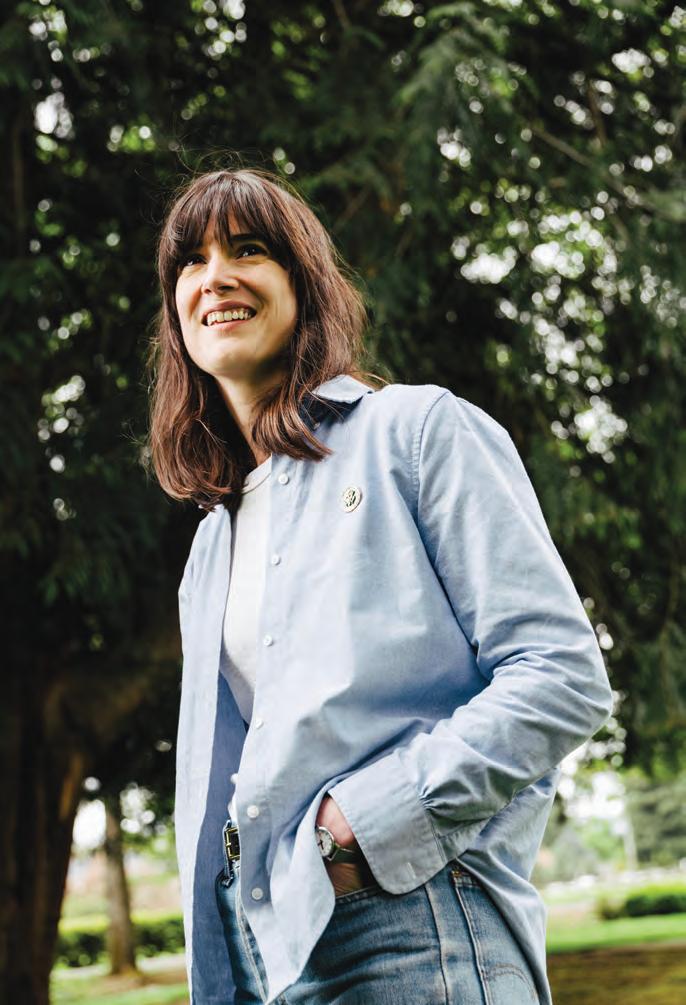
40 Object of Study
WHA T REED STUDENTS ARE LOOKING AT IN CLASS In the Zebrafish Tank

Reed is an extraordinary place, and as president, I want to make sure that everyone in the Reed community keeps an eye on the future as we tend and care for our college, so that it may remain strong for generations to come. I want to highlight what I see as the hopes and ambitions of a shared vision for Reed.
First and foremost, we will continue to honor Reed as the distinctive college it is—a haven for intellectual and creative exploration that prepares our students to address big and important problems that aren’t easily or quickly solved, including justice, peace, sustainability, and human welfare.
We believe in the value of a well-rounded liberal arts education and in relationships forged in classrooms, studios, laboratories, and serendipitous connections. We will continue to recruit and support talented students, faculty, and staff, who can thrive together on our campus.
In keeping with our commitment to anti-racism, I want to position Reed as the most multiracial, multicultural, intellectual college in the world. I want to ensure that a Reed education is accessible to students from a diversity of backgrounds, and that every student finds a sense of belonging on campus.
Most of all, I want to make sure our students come away from Reed with knowledge, skills, and abilities that will serve them throughout their lifetimes. That means offering a variety of experiences that keep students engaged, and finding new ways for Reedies to make an impact now and into the future. I also want our graduates to keep Reed in their hearts and find ways to stay engaged with the life of the college. Involved alumni make our community stronger and are vital to sustaining Reed’s mission.
As this issue makes abundantly clear, important work is taking place at Reed all the time, and that work extends beyond our campus. Whether running for Congress and succeeding against the odds, as Marie Gluesenkamp Perez ’12 has done, or developing a breakthrough cancer-fighting drug, as has Vollum Award recipient Kevan Shokat ’86, the stories of our alumni are inspirational.
For 115 years, Reed has persisted and risen to a multitude of challenges. That is because of the amazing people who have been drawn here and who hold the college to a high set of standards. Looking toward the next 115 years, I am confident that Reedies—and the world—will benefit from the bright lights of curiosity, inquiry, and love of learning that this college fosters. We are small, yet mighty. Long live Reed!
www.reed.edu/reed-magazine
3203 SE Woodstock Boulevard, Portland, Oregon 97202 503-777-7591
Volume 102, No. 2
REED MAGAZINE EDITOR
Katie Pelletier ’03 503-777-7727 pelletic@reed.edu
WRITER / IN MEMORIAM EDITOR
Randall S. Barton 503-517-5544 bartonr@reed.edu
WRITER/EDITOR
Rebecca Jacobson 503-517-7735 rjacobson@reed.edu
ART DIRECTOR Tom Humphrey tom.humphrey@reed.edu
CLASS NOTES EDITOR
Joanne Hossack ’82 joanne@reed.edu
REEDIANA EDITOR
Robin Tovey ’97 reed.magazine@reed.edu
GRAMMATICAL KAPELLMEISTER
Virginia O. Hancock ’62
REED COLLEGE RELATIONS
VICE PRESIDENT, COLLEGE RELATIONS AND PLANNING
Hugh Porter
EXECUTIVE DIRECTOR, COMMUNICATIONS & PUBLIC AFFAIRS
Sheena McFarland
Reed College is an institution of higher education in the liberal arts and sciences devoted to the intrinsic value of intellectual pursuit and governed by the highest standards of scholarly practice, critical thought, and creativity.
Reed Magazine provides news of interest to the Reed community. Views expressed in the magazine belong to their authors and do not necessarily represent officers, trustees, faculty, alumni, students, administrators, or anyone else at Reed, all of whom are eminently capable of articulating their own beliefs.
Reed Magazine (ISSN 0895-8564) is published quarterly by the Office of Public Affairs at Reed College. Periodicals postage paid at Portland, Oregon.
Postmaster: Send address changes to Reed Magazine 3203 SE Woodstock Blvd. Portland OR 97202-8138
Audrey Bilger President of Reed
We believe in the value of a well-rounded liberal arts education and in relationships forged in classrooms, studios, laboratories, and serendipitous connections.
We’re planning to give Reed Magazine a post-pandemic update. Will it be a redesign? Maybe. A refresh? We’re still planning. But, we want to hear from you before we touch anything. The magazine is a place we meet as a community, and it’s important to us that you are a part of this process.
In the coming weeks, you will receive a survey in your email inbox, and I hope you will take a moment to fill it out. As part of the survey you can indicate if you would like to be contacted with more questions or would like to be part of an alumni focus group. If you need a paper copy of the survey, please let us know.
We will take a brief hiatus in December while we’re under construction. You’ll receive a fall issue, and then we’ll be back in your mailboxes in spring 2024.
—KATIE PELLETIER ’03, EDITOR
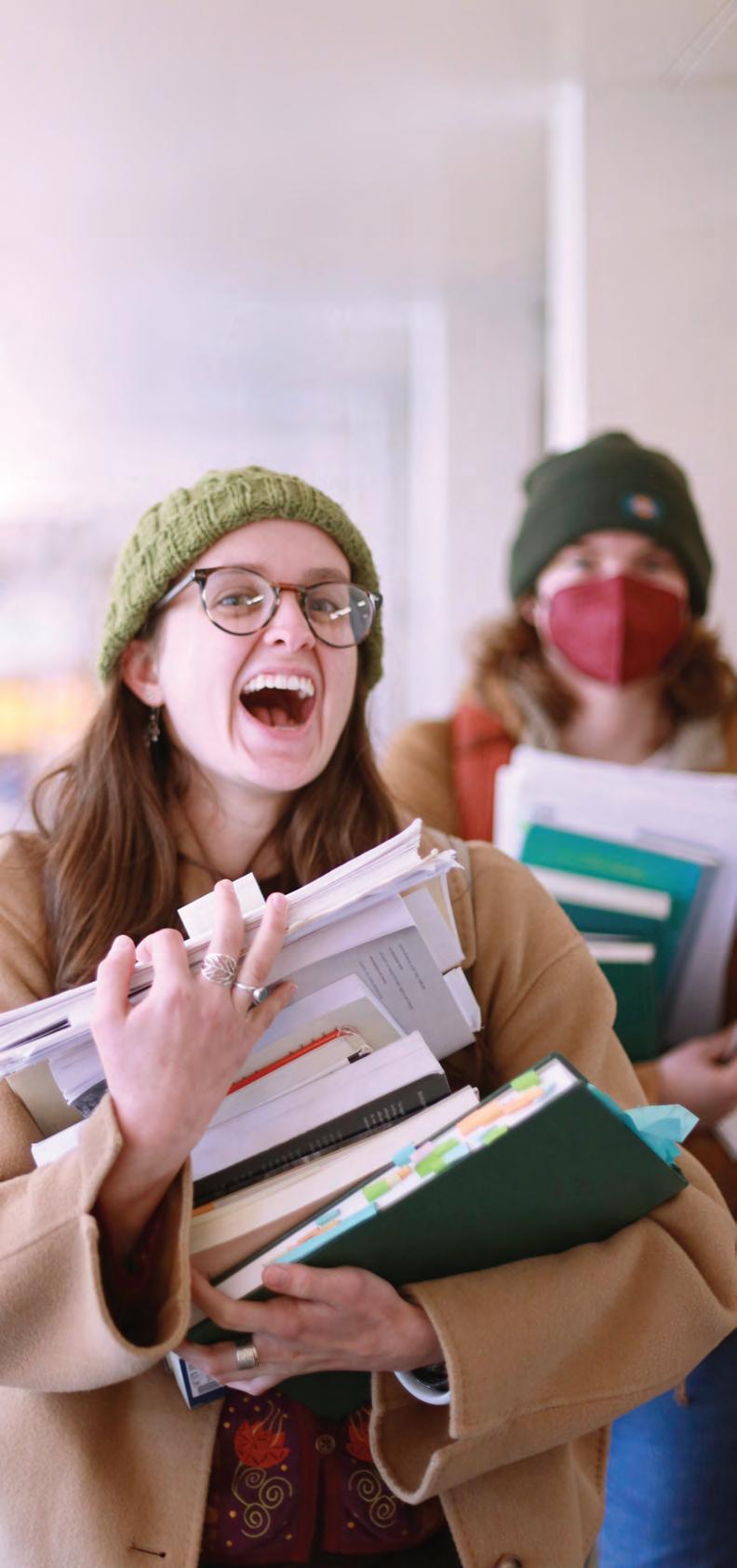
The third floor of the library has been transformed into an academic space, thanks to a $1 million grant from the M.J. Murdock Charitable Trust. Expanded by more than 4,000 feet to create a large classroom, group work spaces, and a suite of seven faculty offices, the renovation unites the mathematics and statistics department with the computer science department, which reflects the connections the programs share. Computer science became its own major in 2017 but maintains a strong emphasis on mathematics, and many students pursue an interdisciplinary computer science–mathematics major. Statistics, meanwhile, remains housed within the math department, but in recent years has seen faculty growth and a rise in student interest.
According to Prof . Angélica Osorno , chair of the mathematics and statistics department, the proximity offers a slew of benefits and opportunities. “This is important in terms of administration of the departments, but also in terms of collaboration, both in research and teaching,” Osorno says. “It’s very easy for me if I’m working on a research problem and there’s a question one of my colleagues might be able to answer, I just go down the hall. Or if I’m having a meeting with one of my thesis students and we’re dealing with something related to statistics, I just go to the office of my statistician colleague.”
Osorno emphasizes that the new common spaces also facilitate vital connection and collaboration among students. “We have math students talking to CS students, stats students talking to CS students, and so on,” she says. She adds that in the past, visiting faculty had to be placed elsewhere on campus because of space constraints, which impeded communication and led to a sense of isolation.
“We’re a pretty collegial group of people, and we like being together,” Osorno says. “We’re constantly having conversations, so it’s really valuable to all be on the same floor.”
A DESK OF ONE’S OWN: Reed’s thesis desk lottery returned in March, the first time the tradition had taken place since before the pandemic. (Here, Sofie Larsen-Teskey ’23 schleps her books to her new desk.) The event marked the completion of renovations to the library’s south wing, which received new and refurbished carrels—following architect Harry Weese’s original 1963 design—as well as a major seismic upgrade. Other improvements include new windows, new compact shelving, and new study spaces, as well as an accessible room for students with accommodation needs.
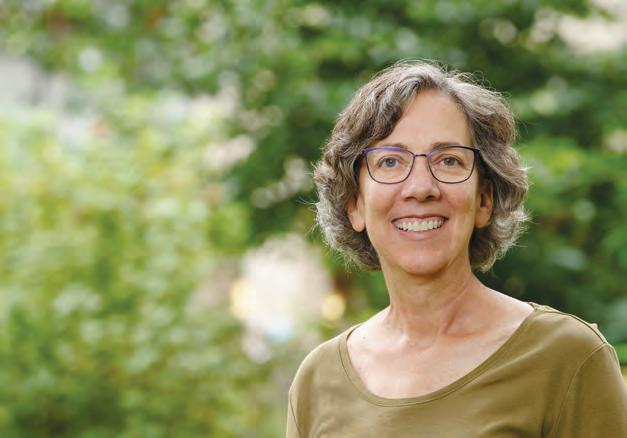
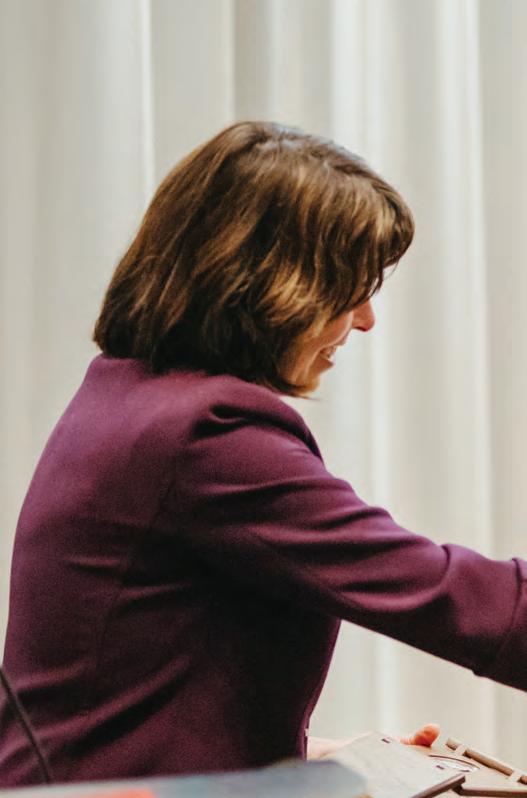
If it were up to Elizabeth Drumm, John and Elizabeth Yeon Professor of Spanish and Humanities, Spanish author Ramón del Valle-Inclán would be as widely read as T. S. Eliot, Virginia Woolf, and James Joyce. Like those giants, Valle-Inclán was a modernist innovator. He published across disparate genres—plays, poetry, novels, art criticism, essays—and even created his own, the esperpento, which distorts reality to emphasize the grotesque.
But outside Spain, Valle-Inclán is little known. He died in 1936, the year the Spanish Civil War began, and his work was censored under Francisco Franco, who ruled until 1975.
“[Franco] really shut down a lot of the literary flow in and out of Spain,” Drumm says. “But the issue of translation is also part of it. There are anthologies of modernism [that] don’t include Spanish authors at all.”
Drumm’s efforts to make ValleInclán part of the conversation have gotten a notable boost: this year she received a fellowship from the National Endowment for the Humanities to support her work on a translation of and critical introduction to La media noche: Visión estelar de un momento de guerra (Midnight: Astral Vision of a Moment of War). The text, written during World War I after Valle-Inclán’s
trip to the western front on the invitation of the French government, is an attempt to express simultaneity. “How do you represent temporal experience in literature?” Drumm asks. “ValleInclán does it through this view, as he says, from the stars. He imagines himself above, looking down at the whole front and describing what happens simultaneously over the course of one night. It’s fascinating.”
For Valle-Inclán, this perspective isn’t mere formal innovation—it’s also a reflection of his occult fascinations. Around the same time as La media noche, Valle-Inclán published La lámpara maravillosa (The Lamp of Marvels), an aesthetic treatise that Drumm describes as “a compendium of occult thought.” Tied to the theosophical movement of the time, the dense tome synthesizes traditions that include gnosticism, kabbalah, alchemy, Spanish mysticism, and the hermetic tradition. If La lámpara maravillosa is theory, Drumm says, La media noche is an attempt to put ideas into practice.
Drumm adds that a former advisee of hers, Susana Mizrahi ’15 , wrote her thesis about La media noche: “Advising Susana’s thesis was instrumental in my thinking about the text and conceptualization of the translation project.” —REBECCA JACOBSON
For years, a protein mutation commonly found in cancer cells was thought to be “undruggable,” a term coined to describe a protein that will not interact with medications. Scientists have been trying to target the protein, known as KRAS, since the 1980s. But in 2013, researchers at UC San Francisco developed a way of flagging the mutated proteins for targeted attacks. Led by Kevan Shokat ’86, UCSF’s Howard Hughes Medical Institute investigator, the discovery paved the way for a new class of cancer drugs that could save lives and may one day even lead to a cure.
“It’s a really great experience to have so much information out there, but not seeing the exact path to the drug, and then just try things, shut it down, try another thing, shut it down, and then get lucky along the way,” says Shokat, this year’s recipient of the Vollum Award for Distinguished
The award, created by the college as a tribute to Howard Vollum ’36, recognizes the exceptional achievement of a member of the scientific and technical community of the Northwest. Endowed in 1975 by a grant from the Millicent Foundation, it is now part of the M.J. Murdock Charitable Trust.
This has been a big year for Shokat. He was also awarded the Sjöberg Prize in cancer research by the Royal Swedish Academy of Sciences, which recognized him as “the first person to succeed in blocking one of the mutated proteins that cause most cancer cases.” They added, “This is a huge scientific breakthrough that is bringing hope to people who are critically ill with lung cancer.”
Two KRAS drugs have received FDA approval so far: sotorasib and adagrasib. After first-line therapies, the drugs are used to target a KRAS mutation that occurs in about a third of lung cancer patients. (Trials are currently underway to explore prescribing it earlier.) Because they work by targeting a single mutant protein and halting its communication, the new drugs are more precise than treatments like chemotherapy, which affects
noncancerous cells as well as the tumor. “In patients who respond well, it can make a huge difference. For the approximately 30 percent of patients who do,” Shokat says, “they experience rapid tumor shrinkage.”
As new therapies targeting KRAS mutations evolve, Shokat hopes response rates will improve. “What’s exciting is a lot of companies have made their own drugs like this, and they’re combining it with other drugs that they’ve made,” he says. “So I think this is just the beginning of the response and benefit we can see in patients.”
Shokat first fell in love with scientific research at Reed. He’d attended a high school without a robust science curriculum, so when he arrived at the college, he recalls, “most everything in my science classes was new to me.” His fascination was immediate. “I just loved the deep dive of it,” he says. “And I always tell people who are thinking about Reed, to me, an intro class there is just so different than anywhere else, because all the professors taught you as if you were going to be getting a PhD in that topic.”
One of these professors was Phyllis Kosen [chemistry 1981–83]. Shokat
remembers attending her office hours in the Reed coffee shop with excitement. “She was a biochemist, and so I got to start thinking— even though it was intro chemistry—about proteins, and that was really, really great,” he says. It was under the tutelage of beloved chemistry professor Thomas Dunne [1963–95] that Shokat came to appreciate the logic and clarity of chemistry.
Receiving the Vollum award for work in a field he first encountered at Reed was cause for celebration. For Shokat, it’s also a full-circle moment. Reed wasn’t just an academic home for him: it’s where he met his wife, Trustee Deborah Kamali ’85, and it’s where his three children—Kasra Shokat ’14, Mitra Shokat ’18, and Leila Shokat ’21—attended college. He draws a straight line from his time at Reed to his experiences in his lab at UCSF. “I tell my students now: I’ve been running a lab for 25, 28 years, and every day, coming in is basically the same as when I went into lab to do my Reed thesis, or when I went into lab to do my PhD, because little things change, but just getting to think about molecules all the time has been so, so fun,” he says. —MEGAN
 BURBANK
BURBANK
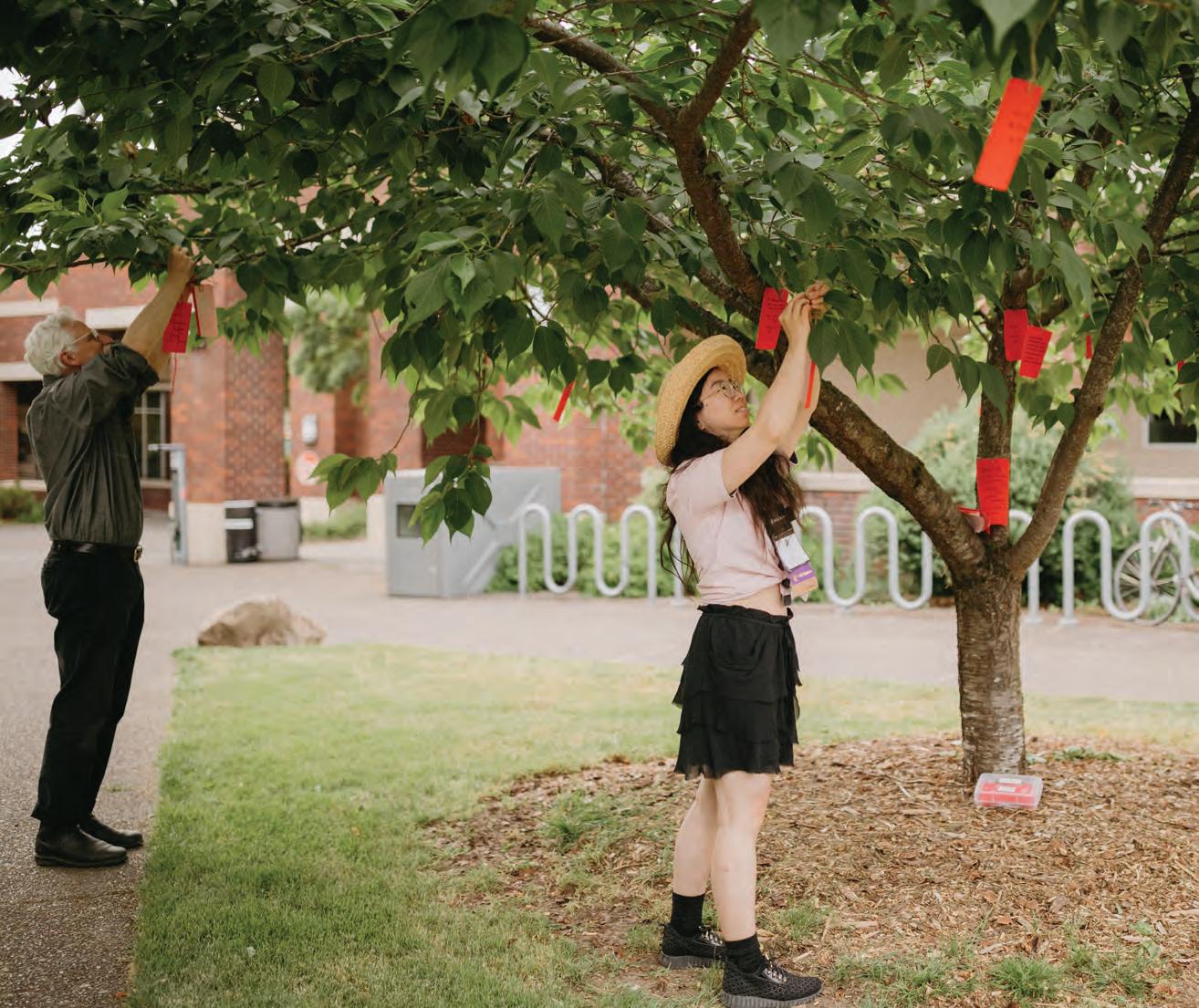
Congratulations, graduates! As you leave the Reed campus and start on all life’s journeys, know that Reed never leaves you. You are and always will be a Reedie. And as such, you have a global network of alumni to connect with. We in the alumni relations office are here to help facilitate that. We work to keep you connected to your classmates and all who came before and will come after you. So feel free to reach out. Email alumni@reed.edu or visit alumni.reed.edu for more information.
As I considered what to share with you in this issue’s Advocates of the Griffin, I started thinking about all the alumni who engaged with Reed throughout the past school year; I was struck first by the passion each has for the college. The dedication to ensuring that a Reed education remains available to current and future students is foremost. A close second is a strong belief that Reedies should remain connected to the college and one another.
Alumni interactions happen every day, whether through the alumni relations office, through the Center for Life Beyond Reed, or under the radar, such as by responding to a LinkedIn message. Whether an alum is engaging for the first time or for more times than they can count, the effort makes a meaningful impact on our Reed community.
I am honored to thank all the volunteers who dedicate their time and talent to Reed. Your hard work is often silent, and your recognition may be limited within these pages,
but our gratitude is not. A huge thanks to all of the alumni volunteers: alumni board, Alumni Fundraising for Reed, alumni trustees, career coaches, alumni chapters, Committee for Young Alumni, Diversity and Inclusion Committee, Foster-Scholz Club, student mentors, Paideia, Pathfinders, Reed Career Alliance, Reunions, summer internship hosts, and the myriad others who serve the Reedie community officially and unofficially.

The Babson Society Outstanding Volunteer Award, established in honor of Jean McCall Babson ’42 , recognizes outstanding volunteer efforts by Reed alums. The alumni board nominating committee bestows the Babson Award each year. This year’s awardee is Govind Nair ’83. Govind is honored for his longstanding commitment to Reed and for being the driving force behind the Reed Career Alliance.
The Distinguished Service Award, established in 1975, recognizes a member of the Foster-Scholz Club who has made significant contributions to their community and/or the college. The Foster-Scholz Steering Committee presents the DSA during the Foster-Scholz Luncheon at Reunions each year. This year, the committee recognizes Mark McLean ’70 and Eduardo Ochoa ’73 for their decades of involvement in Reed College volunteer opportunities and service to their communities.
There are many ways to volunteer your time and expertise to serve the Reed alumni community. Which one is right for you? Email alumni@reed.edu, and a staff member will contact you to find the perfect fit.

While there are great resources if you know exactly what career you want, the Committee for Young Alumni’s Pathfinders Initiative is more your jam if you have a broad area of interest and want to learn about opportunities within it that you may not have even imagined!
Are you a new(er) graduate from Reed or just contemplating or starting in a new field and want to connect with an alumni Pathfinder volunteer? Are you interested in being a Pathfinder—offering recent experience and perspective in a constantly changing world? Email alumni@reed.edu or visit alumni.reed.edu. We’d love to connect with you!
OCTOBER 13–15, 2023
Join Reedies at Camp Westwind—a magical weekend on the Oregon coast filled with laughter, bonfires, lots of sand, and plenty of relaxing. Escape cell service (and your regularly scheduled plans) at this family-friendly weekend led by alumni volunteers.
Space is limited and will sell out! Registration is now open.

Far above, the hawk is circling.
All it takes is eight notes—eight notes from the solo violin—and we’re soaring high above the mountains, riding the waves of the wind.
In Vineyard Rhythms, a violin concerto inspired by the lush landscape of Yamhill County, Professor Emeritus David Schiff [music 1980–2019] demonstrates his mastery of shifting perspective.
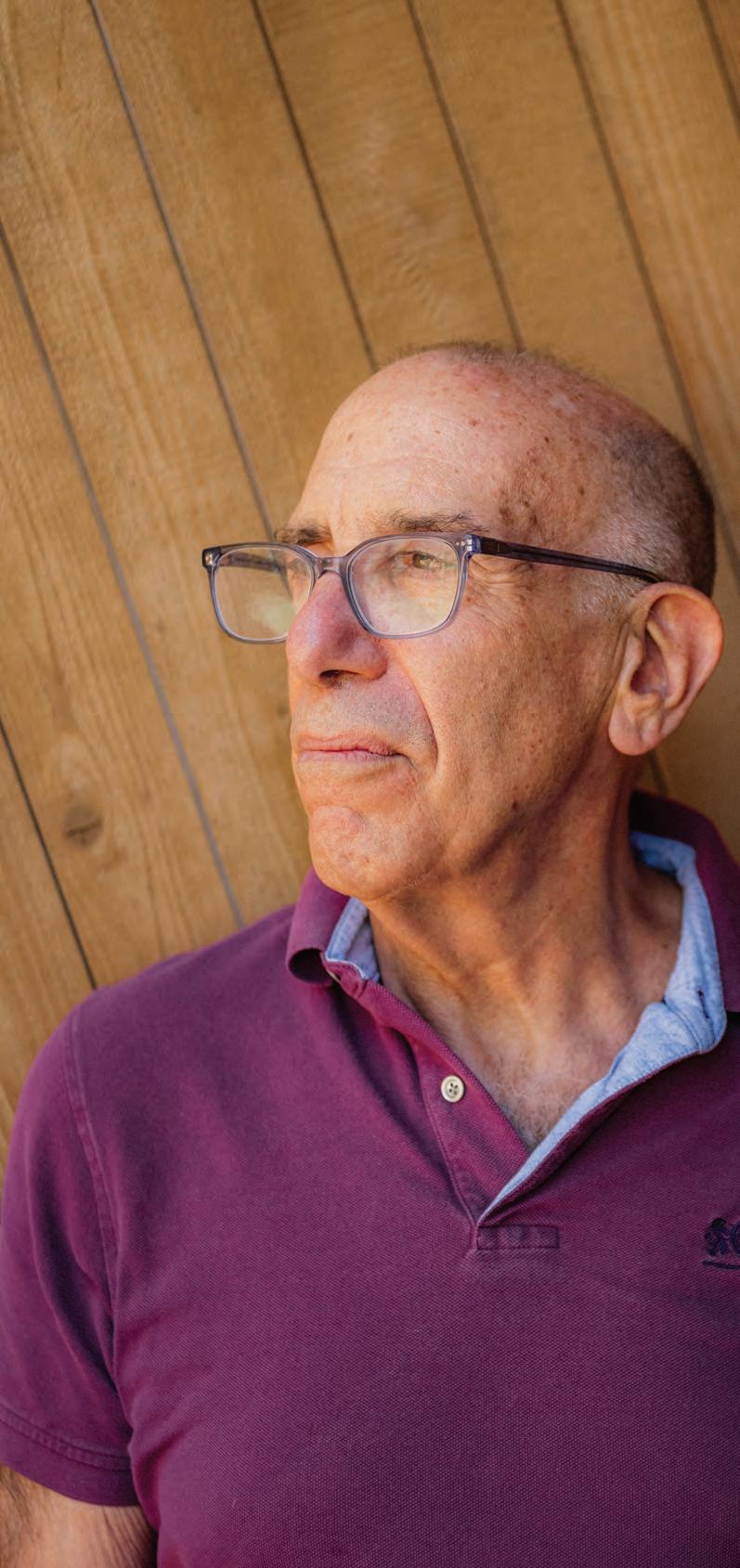
The piece begins by looking down at the land from the perspective of a hawk calling to its avian companions dancing in the sky. It then drops to the land, invoking the richness of the earth that feeds the vines as they ripen and burst with energy. It finishes with a joyous tribute to the bubbling transformation of harvest.
Just as the piece serves as a metaphor for the cycles of life, it also serves as a window into the ever-evolving career of David Schiff, a career forged by the liberal arts and tempered by the intellectual atmosphere of Reed. From Gustav Holst to George Gershwin, from Duke Ellington to Frank Zappa, Schiff’s influences run far and deep, surfacing in unexpected places.
Schiff retired from teaching a few years ago, but he’s as busy as ever. In addition to Vineyard Rhythms, commissioned by Oregon
With ever-evolving subjects and inspiration, Prof. David Schiff’s musical career plays on.
wine industry pioneer Susan Sokol-Blosser MAT ’67 in honor of her mother, he also recently composed Prefontaine, a symphony celebrating the enduring influence of Oregon running legend Steve Prefontaine, whose brilliant career was cut short by a fatal car accident in 1975.
Taken together, these pieces, which both premiered last summer, reveal how Schiff brings profound curiosity, a creative and inventive spirit, an appreciation of the gifts of others, and a drive to connect with the audience in a profound way.

And that he has a lot of fun.
David Schiff’s talents and accomplishments are nothing short of prodigious. Well-known for his compositions for chamber and symphonic music, he’s fluent in the languages of jazz, opera, klezmer, and more. He’s also written widely, including books on Duke Ellington, George Gershwin, and Elliott Carter.
Yet he didn’t come to a musical career readily. Born in 1945 and growing up in the New York City area, he played piano from a young age and listened to a diverse collection of music, taking in the sights and sounds of Broadway. He majored in English literature at Columbia University (where Susan Sontag and Edward Said taught his freshman year core course), studied on a fellowship at Cambridge, and intended to become an English professor.
In 1968, to avoid being drafted, he took a crash summer course at NYU and then spent a year teaching junior high in the South Bronx. “On several occasions at Reed faculty meetings, I’d make a statement that everything I ever needed to know about teaching I learned that year,” he laughs.
Back at Columbia, he was approaching 30 and well on his way toward a PhD in Victorian literature (intending to write his dissertation on William Thackeray), when a visit to an otherwise unmemorable therapist provided the lightbulb moment. “I asked, ‘Why is it that no one believes I’m a musician?’ and the therapist said, ‘Why should they?” Schiff immediately applied for summer school at the Manhattan School of Music and found his new path. To pay his tuition, he taught in the Manhattan School’s
humanities program, a combination he calls “good preparation for Reed.”
Always attracted to nature’s beauty, Schiff found Oregon’s coastlines, mountains, and high deserts significant draws when he came to Reed in 1980 to teach music theory and composition. He soon branched out to teach courses in the history of jazz, the music of Duke Ellington, American musical theatre, and a course called Music since 1960 that featured a range of genres from avant-garde to rap.
“David brought a deep knowledge of music—and new music—to Reed,” says his colleague Prof. Virginia Hancock [music 1990–2016], whose career paralleled Schiff’s at Reed. “He was a very devoted teacher who took enormous trouble over his students. He was tough. But they learned he cared for them.”
Schiff conducted the Reed orchestra for many years and was also instrumental in founding two long-standing Reed traditions: RAW and ROMP.
RAW (Reed Arts Weekend) was the brainchild of a group of young professors who were dismayed at the lack of visiting performers on campus in the 1980s and wanted to provide a venue. Eventually, RAW could no longer be contained in a single weekend and became Reed Arts Week, though it evolved away from the performing arts and focused more on studio arts.
Schiff came up with the idea of ROMP (Reediana Omnibus Musica Philosopha) after participating in the Bard College Music Festival, an annual event involving both performers and scholars. From 1999 to 2016, ROMP enlivened the campus with concerts and talks on a variety of subjects.
Schiff remains profoundly grateful for Reed’s support for his work as a composer. He also relished the opportunity to work with such a range of committed students. “I never had to motivate my students,” he says. “They arrived motivated. When you presented them with a challenge, they would do it.”
Many of his students would only discover their deep connection to music after matriculating, and he believes Reed was the perfect place for those students. “I could take a student like that and move them along,” he says, “I loved thinking about how to help students find their voice.”
An appreciation of the value of working with others is one of the key insights that has driven Schiff’s career. “When I think about life as a composer—I said this to students many times—aside from the pleasure of getting the notes on the page, you get to have your music played by these wonderful musicians who bring everything they have to your music and they elevate it.”
It’s no surprise that in addition to his work with students at Reed, Schiff never lost sight of his other vocation: composing.
Susan Sokol Blosser MAT ’67 is a powerhouse in her own right. After getting her bachelor’s degree in history at Stanford, she earned her MAT from Reed and went on to become a pioneer of the Oregon wine industry. She drove the tractor, pruned the vines, and built the vineyard into a leader in sustainable agriculture by limiting pesticides, installing solar power, and reducing greenhouse gas emissions. Along the way, she raised two kids and wrote four books.
“I think of the liberal arts as education for life,” she says. “I’m living proof of that.” She’s such a firm believer in the value of a Reed education that she recently joined the college’s board of trustees.
She’s long held a belief in the power of music to transform lives. In 2011, she founded the Yamhill Enrichment Society (YES), which focuses on literacy and music enrichment for youth in Yamhill County. As part of YES, Sokol Blosser launched the Junior Orchestra of Yamhill County (JOY) in 2017. Its audacious goal is to teach every elementary school student in the county to play the violin. She believes “playing the violin is like a full-body workout for the brain.”
Sokol Blosser had thought about setting her vineyard to music for years before asking Schiff to compose Vineyard Rhythms as a tribute to her late mother, Phyllis Feingold, who was an accomplished classical violinist and member of the Chicago Women’s Symphony in the 1920s. Feingold might have continued to work as a professional musician in a more enlightened era. But in her time, she was unable to balance the demands of a musical career with being a wife and a mother. (Sokol Blosser is currently working on a novel-like memoir of her mother with the working title The Choices We Make.)
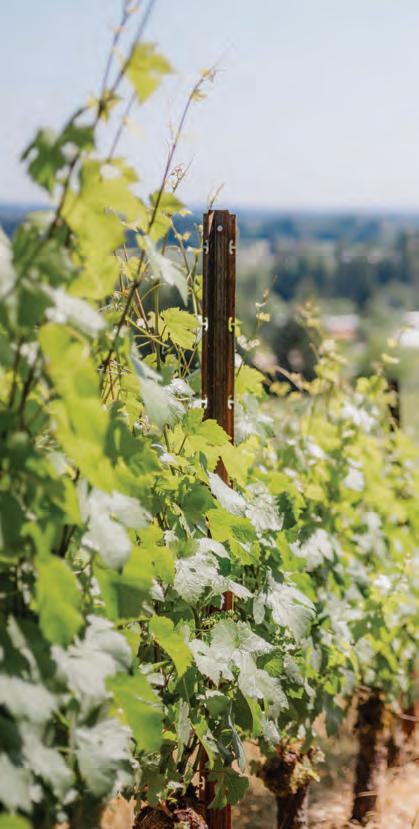
In addition to her mother, Sokol Blosser wanted to honor the vineyard where she has lived and worked for over 50 years. “I wanted to capture in music its beauty, with its annual passage through growth, fruitfulness, dormancy, and rebirth,” she says. “In essence, I wanted to put the vineyard to music.”
Neither she nor Schiff was aware of their shared connection to Reed before the project began but found it a delightful coincidence. Schiff found another surprise in the commission. “Having the vineyard as a destination got us through COVID,” he says, remembering the many trips he and his wife, Judy, made throughout the changing seasons to experience the landscape and walk among the rows of vines that straggle across the hills like staves of music on a page.
On an early visit, as red-tailed hawks circled in the sky, Sokol Blosser pointed out their nest high in a tree. That inspired the first movement, “Hawk,” where a vivid eight-note theme on the violin loops and soars over the winter landscape like a raptor on the wing, circling its dormant domain, awaiting the arrival of spring.
In the second movement, “Gaia,” the music travels from the earth up, as Schiff weaves together ripening harmonies to conjure the growth of the vines, summoning forth their power in the stillness, as spring warms to summer and the sound grows stronger and more confident. The final movement, “Harvest,” pulses with jazzy, triumphant intensity as the vineyard workers hustle to gather the lush bounty into the vats.
Schiff says the piece benefitted from Sokol Blosser’s own writing about the vineyard, which she sent him during the process, but she wasn’t prescriptive, choosing to let him create his own musical reflection of the land. She didn’t hear the piece until it was finished. “I was thrilled with the final product,” Sokol Blosser says, especially the opening notes of Chamber Music Northwest co–artistic director Soovin Kim on solo violin.
Conducted by Francesco Lecce-Chong, the piece premiered in July 2022 with a performance at Chamber Music Northwest, with which Schiff has had a fruitful relationship, writing more than 20 pieces for them since 1982. A second performance occurred at the vineyard as part of a fundraising dinner. That day was beastly hot— Schiff remembers that the thermometer in his car read 114 degrees— so the performance had to be moved inside to the winery’s cellar. Characteristically, rather than being dismayed at the last-minute
change in setting, Schiff was delighted by the added resonance generated by the huge metal wine barrels.
It’s another example of a career that has embraced creativity, opportunity, and being in the right place at the right time. He remembers that when he was five years old, his family bought a recording of Debussy’s La Mer. “It quickly became my favorite piece of music, then and forever,” Schiff says. His family spent their summers at the beach, and it was then that he first realized “the idea that music could take you someplace.”
From the very first notes of Prefontaine, Schiff makes it clear that we’re not going to sit still.
It begins with a bolt from the blue, a burst of piccolos, violins, and timpani that explodes onstage like a starter’s pistol. Amid the eerie aftershock, a ricochet of percussion builds to another explosion. And another. Then,
wafting above the chaos, a lone flügelhorn takes up a lovely, lilting theme, soaring impossibly high, like an archer’s arrow flying into the night and disappearing among the stars.
Like Prefontaine, we are embarking on an odyssey.
The piece was commissioned by the Eugene Symphony for the 2022 World Athletics Championships (held in Eugene) to honor Oregon’s most famous runner. Steve Prefontaine, known as Pre, earned seven NCAA titles for the University of Oregon. His standout performance at the 1972 Olympic Trials 5K before a sold-out crowd at Hayward Field helped fuel the nation’s running craze and catapulted him to fame. Over the next few years, his scrappy, brash identity and will to win made him an international legend until he was killed in a car accident at the age of 24.
Scott Freck, executive director of the Eugene Symphony, says Schiff was top of his list to commemorate Prefontaine. “He has a
dynamism that brings a lot of energy to the orchestra,” Freck says. “He’s obviously a brilliant guy and was an absolute joy to work with.”
Schiff approached the piece with an open mind and a researcher’s zeal. He traveled to the working-class town of Coos Bay, met with sportswriter Curtis Anderson, and talked to people who had known Prefontaine. Under the tutelage of Linda Prefontaine, Steve’s sister and “the keeper of the flame,” Schiff says, he and a team from the Eugene Symphony explored the rugged coastal stomping ground where Prefontaine trained to push himself harder, faster, farther.

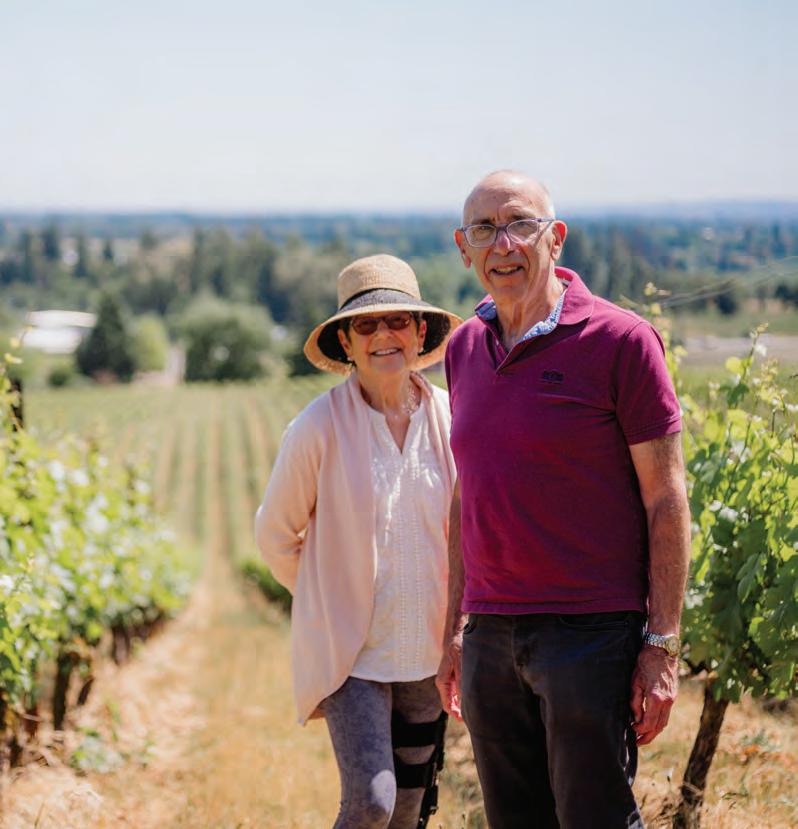
The first movement captures the dramatic landscape on the drive from Eugene, through the Cascade Mountains to the Oregon coast. Schiff wrote it as a passacaglia, a classical form that features a repeating bass line known as an ostinato. But he turned the pattern upside down and put the ostinato up high. At the same time, he reversed the arrow of time. He begins the musical journey at the site in Eugene known as Pre’s Rock, where people have never stopped leaving memorial tributes, then traces the way back to Coos Bay, where the runner was born and raised.
For the climactic third movement, named “5K,” Schiff traced each lap of Pre’s most famous race, matching his stride second by second with music that challenged the performers to keep up just as Pre’s effort challenged his competitors. Schiff organized the movement as a sequence of 12 fugues to represent the 12 laps in a 5,000-meter race. During the performance in Eugene, also conducted by LecceChong, a stopwatch on the screen kept time to match Prefontaine’s best timings. Each fugue was scored for a different group of players, beginning with small ensembles, and gradually building to include the entire orchestra.
As Schiff delved into the project, he found himself returning time and again to one of Prefontaine’s unforgettable quotes. “To give anything less than your best is to sacrifice your gift.”
“I feel that everyone has a gift and the challenge of being true to that gift is what shapes our lives,” Schiff says. “That’s what I wanted the piece to be about.”
Shape-shifter. Time traveler. As he settles into a remarkable phase of a remarkable career, Schiff and his many fans can only wonder, where will music take him next?
The Eugene Symphony brings back Prefontaine for an encore performance on October 19, 2023. It will be recorded and released in 2024.
Oregon’s most famous runner, Steve Prefontaine, in 1972. Susan Sokol Blosser ’67 with Prof. David Schiff at the Sokol Blosser vineyard in Yamhill County, Oregon. PHOTO BY TONY DUFFY /ALLSPORT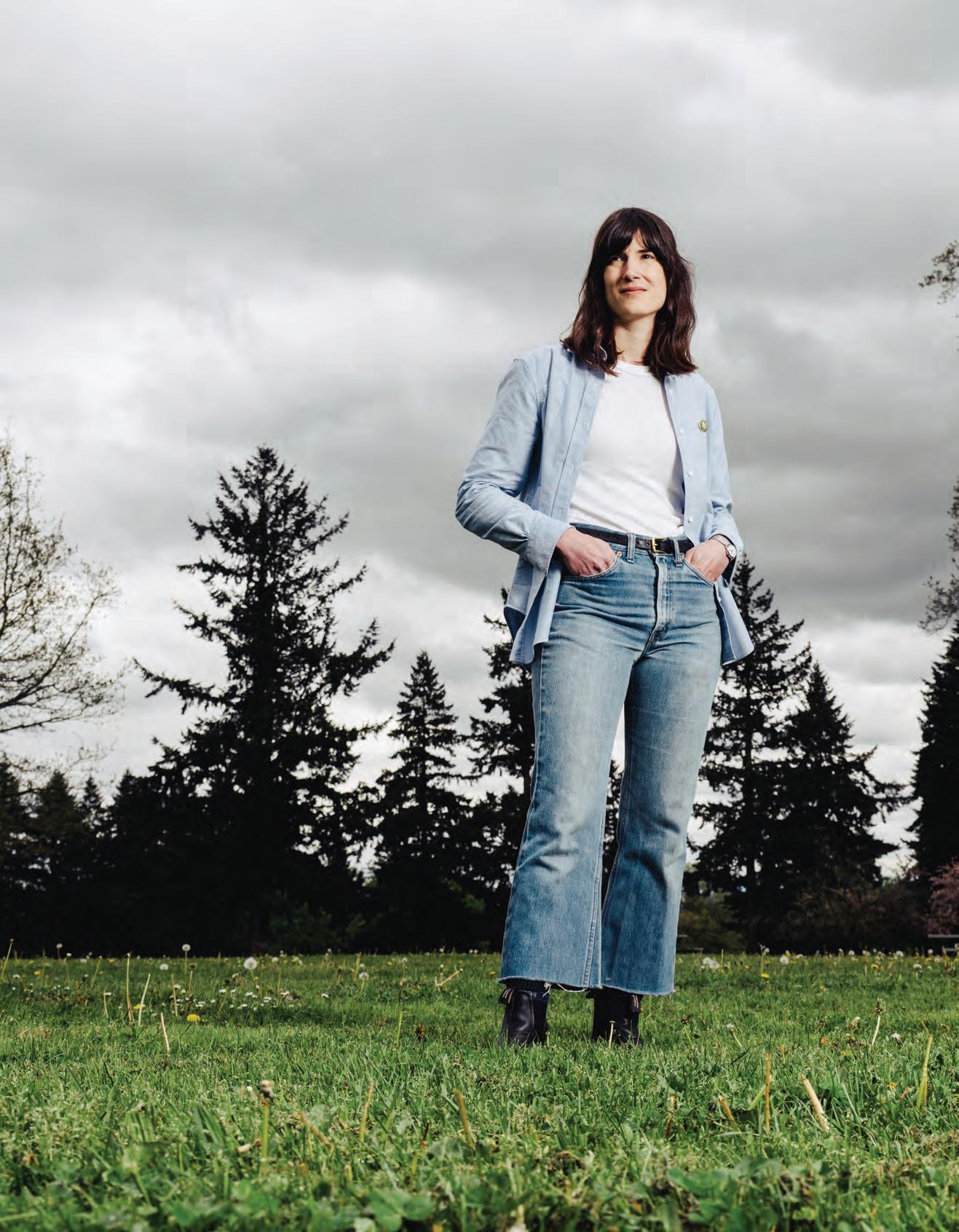
Marie Gluesenkamp Perez ’12 was on the verge of a very big decision.
It was February 2022. The year before, Republican Joe Kent had announced his campaign for Congress for Washington’s Third District over the incumbent, the more moderate, Jaime Herrera Beutler, who had voted to impeach Donald Trump. Trump had endorsed Kent in September. Gluesenkamp Perez was charged up by Kent’s extremist politics; she has called him a “fascist” and a “white nationalist, Nazi sympathizer” online. She was considering running against him.
Her interest in public office was not without precedent. In addition to co-owning an auto repair and machine shop with her husband, Dean Gluesenkamp, she had been involved in her community and active in local politics since 2016, when she ran for, and lost, a seat on the Skamania County Board of Commissioners. Undeterred by the loss, she started working on the Underwood Conservation District board in 2018.
When the idea of running for Congress began to bloom, she called Hannah Love ’12 , a political strategist and her former housemate, to ask her for advice. Love, wanting to be a true friend, tried to deter Gluesenkamp Perez at first. “I think you can do it, if anyone can do it,” Love remembers saying, but she cautioned against long hours and the potential of losing.
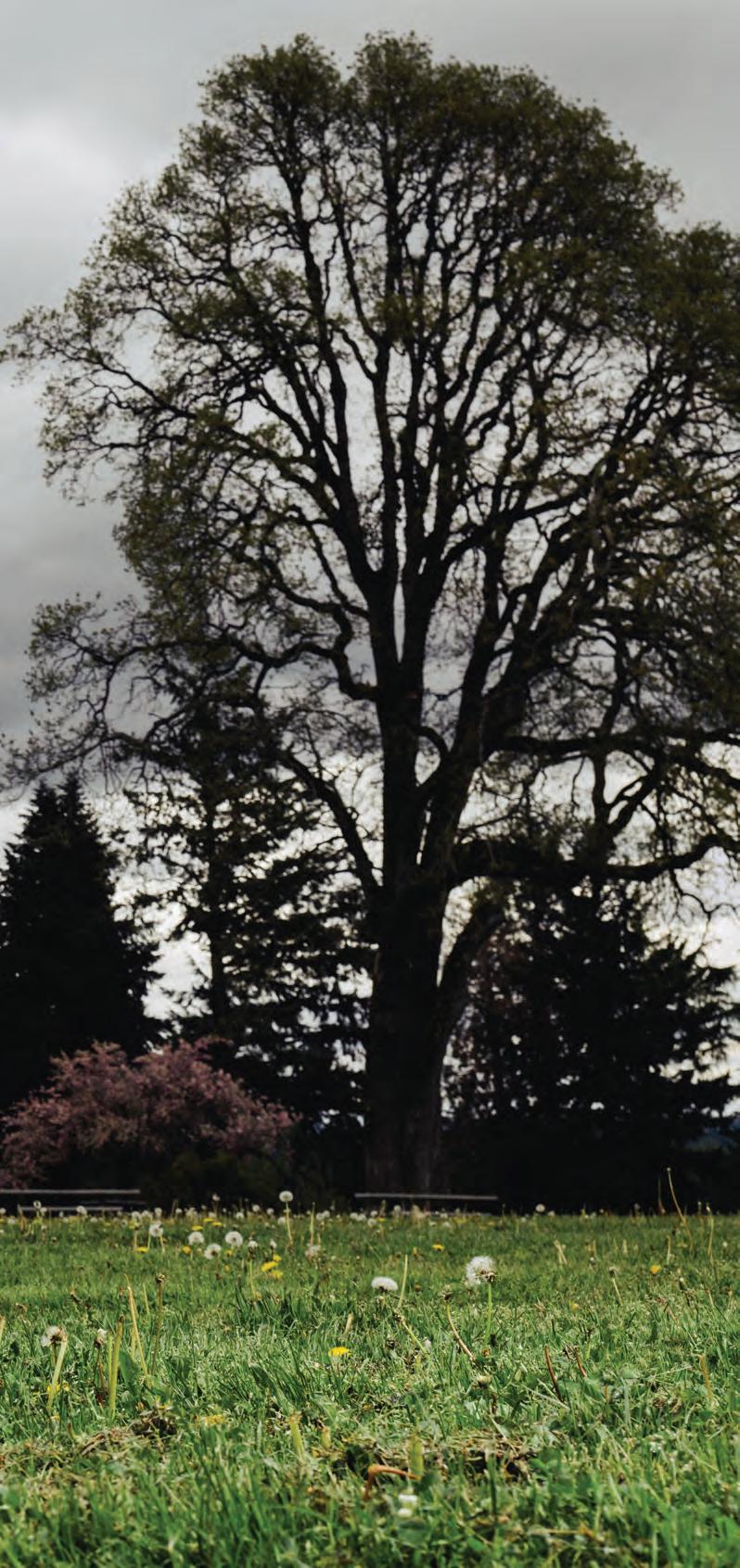
Perez ’12 led a grassroots congressional campaign and surprised the nation when she flipped a district.PHOTO BY MASON TRICA
Making the choice took serious consideration. Gluesenkamp Perez cared deeply for Washington, where her family has deep roots going back generations, and where she’d spent childhood summers playing in the forest. But the true inflection point for her came during a calm moment, while she was nursing her son, Ciro, in the home she and her husband built from the ground up.
“That was the point where I was like, oh, I think I need to do this,” she said.
And she did. In what pundits later called the biggest upset in the 2022 election, she flipped her district to defeat Joe Kent through a grassroots campaign, with no financing from the Democratic Congressional Campaign Committee— despite a two percent predicted chance of winning. Being a political underdog came with a kind of freedom, said Gluesenkamp Perez: “There was not an alternative to being who I am.”
On a cool day in April 2023, the cherry blossom trees surrounding the Battle Ground Community Center in southern Washington State are out in full force: their flowering branches bob in the breeze, promising spring. There’s only half a second to admire them, though; I’m hurrying through the door behind Congresswoman Gluesenkamp Perez and her staffers.
Inside, more than 70 people from all over the state mill about before settling into seated rows. They’re aged young, old, and infant. They wear suits, suspenders, jeans, espadrilles, and baseball caps. And they bear titles as diverse as flower farmer, director of governmental affairs at the Washington State Potato Commission, representative from the Washington ATV Association, director of the Anti-Hunger & Nutrition Coalition, and scientific policy advisor for the Washington State Conservation Commission.
Yet all these people have something in common: they’ll each spend just two minutes talking to Glusenkamp Perez. In their allotted time, they’ll share their hopes and asks for the 2023 Farm Bill, a gigantic, complex piece of legislation that passes once every five years and encompasses such wideranging topics as Supplemental Nutrition Assistance Program (SNAP) benefits, crop insurance, land conservation, forestry
services, commodities pricing, federal loan programs, and rural development. It’s a big deal. A podium stands in the center of the room, waiting for people to approach.
Facing them at the center of a folding table, Gluesenkamp Perez sits flanked by staffers with computers out ready to take notes and stacks of business cards to hand out after the session.
Her bright green pin pops out to designate her as a member of Congress. Otherwise, she’s unadorned. Wearing a blue oxford shirt with the sleeves rolled up, jeans, and Blundstone boots, she looks casual enough that she could go from the district
that draws people in. Maybe it’s her sincerity, or the fact that she’s funny, or that her general approach to life is pretty punk. She doesn’t boast a massive Twitter following, and she hasn’t pulled flashy stunts like attending the Met Gala like some other representatives (at least not yet). But it feels like she’s a local celebrity. During my day with the congresswoman in mid-April, I felt like I was buzzing. At all of our stops, she was excited to see people. But they were really excited to see her.
She urged people not to use any of their precious two minutes at the listening session on niceties, but most couldn’t resist. Joe
office to a timber conference. Likely that’s because, sometimes, she does, in addition to petting cows at creameries and donning a hood to watch students learn to weld (all of which you can witness on her Twitter feed). When not in Washington, D.C., she spends her days in her home state visiting local facilities, meeting with constituents, and engaging in listening sessions like these. “Every day that I don’t have a vote in D.C., I’m in the district,” she told me over the phone prior to our day together. “I’m spending one-on-one time with community leaders, local electeds, and business owners. And I think that’s really critical. You have to know what’s going on in your district.”
Staying in the know, however, is a gargantuan effort, one that the congresswoman says other representatives in “safer” seats don’t have to worry about quite so much. We’re at stop number two of four, a light day according to Tim Gowen ’10, her deputy district director, and Gluesenkamp Perez looks a little wan. She’s recovering from a bout of the flu that left her, her husband, and their 19-month-old son sick with fevers earlier in the week. After one day off, she’s back on the road. Still, her gaze is steady as she smiles and waves hello to the people she knows in the crowd. She holds it trained on every speaker over the next two hours, nodding and taking notes and occasionally interjecting with excitement or concern, never once yawning or looking away.
Though she’s unassuming in appearance, Gluesenkamp Perez has a certain star power
Zimmerman, representing the Clark-Cowlitz Farm Bureau, ended his time by saying, “I’d like all of us to understand the historic situation we have where a Clark and Cowlitz County representative from southwest Washington is on the Ag commitee. I don’t think that’s ever happened.” Applause ensued.
Gluesenkamp Perez particularly related to several speakers. Rob Baur, who owns Baurs Corner Farm and identifies as the CTO, or “Chief Tractor Operator,” shared his ongoing problems with a new John Deere tractor to illustrate a need for federal right-to-repair legislation. Perez agreed emphatically. “You can’t wait three weeks [to fix the tractor] when you’ve got harvest coming,” she said.
Her connection was visibly strongest to Nicole Curtis, a community advocate at Northwest Harvest, a hunger relief agency, who took the podium to request permanent protection for SNAP. Wearing a low, tight ponytail, Curtis kept her head down as she read quickly from her script. She spoke of struggling to feed her two sons after a pandemic layoff and the end of SNAP emergency allotments in February after President Biden signed the Consolidated Appropriations Act. In closing remarks, Gluesenkamp Perez called her out specifically to thank her for making the time to be there. After the session, she rushed to speak to her first. I caught up with Curtis as folks were filing out from the community center. She is a huge fan of the congresswoman; she even donated to Gluesenkamp Perez’s campaign. “She’s got a different energy; it’s refreshing,” she said.
“ That was the point where I was like, oh, I think I need to do this.” —Marie Gluesenkamp Perez ’12
The hours added up as we stopped at a community clinic and a food bank. Gluesenkamp Perez kept up the energy, even as she paused to occasionally blow her nose. Some of her remarks, like one on how empowering it is to know how to cook beans and rice, felt rote. But when she opens up to tell her own stories, she gets through to people. At North County Community Food Bank in Battle Ground, she shared that her grandma had volunteered at a food bank, which resonated with the crew. She also made it a point to emphatically thank everyone for their work throughout our tour.
After, I chatted with lavender-haired volunteer Bev Jones (Battle Ground Citizen of the Year 2016) to talk about the visit. Jones stays away from conflict, which makes it tricky to talk politics with neighbors displaying Joe Kent signs in their yard. But she’s happy Gluesenkamp Perez won and hopes that she hangs on to the seat. “I
appreciate her being a woman in that position and a small business owner. Just her showing up with her questions today, I’m even more impressed,” she said. She paused and smiled, before doing a little wiggle. “She’s my girl.”
When Gluesenkamp Perez decided to run for office, the first order of business wasn’t brainstorming how to fundraise or hire consultants, but securing childcare (an issue she has spoken passionately about; she and Dean often brought Ciro with them to the auto shop because they couldn’t find affordable daycare). She called her mom and motherin-law to ask for extra support during the campaign. Then, she needed to get Dean on board; he was hesitant. “It’s a family decision to run for Congress,” Gluesenkamp Perez said. “He really believes in me, and his perspective was, I’m not just saying yes to a campaign. If
you run, you’re gonna win. And that’s going to change everything about our life.”
Dean ended up being right.
The odds were not in her favor. With a lack of support from the DCCC and even groups like EMILY’s List, which supports women candidates in favor of abortion rights, she embarked on an intensive grassroots campaign. (Emily’s List endorsed her in October 2022, less than a month before the election.)
“All the pundits said I had a two percent chance, and I get it, people try to make strategic decisions,” Gluesenkamp Perez said. “But it’s hard when they say they want people who work in the trades, and women, and moms, and Latinos. Like, where the hell are you?” Finding media coverage was also a challenge. She reached out to me a year ago to cover her story; the New York Times declined the pitch (now, the Times’s coverage of Gluesenkamp Perez includes an array
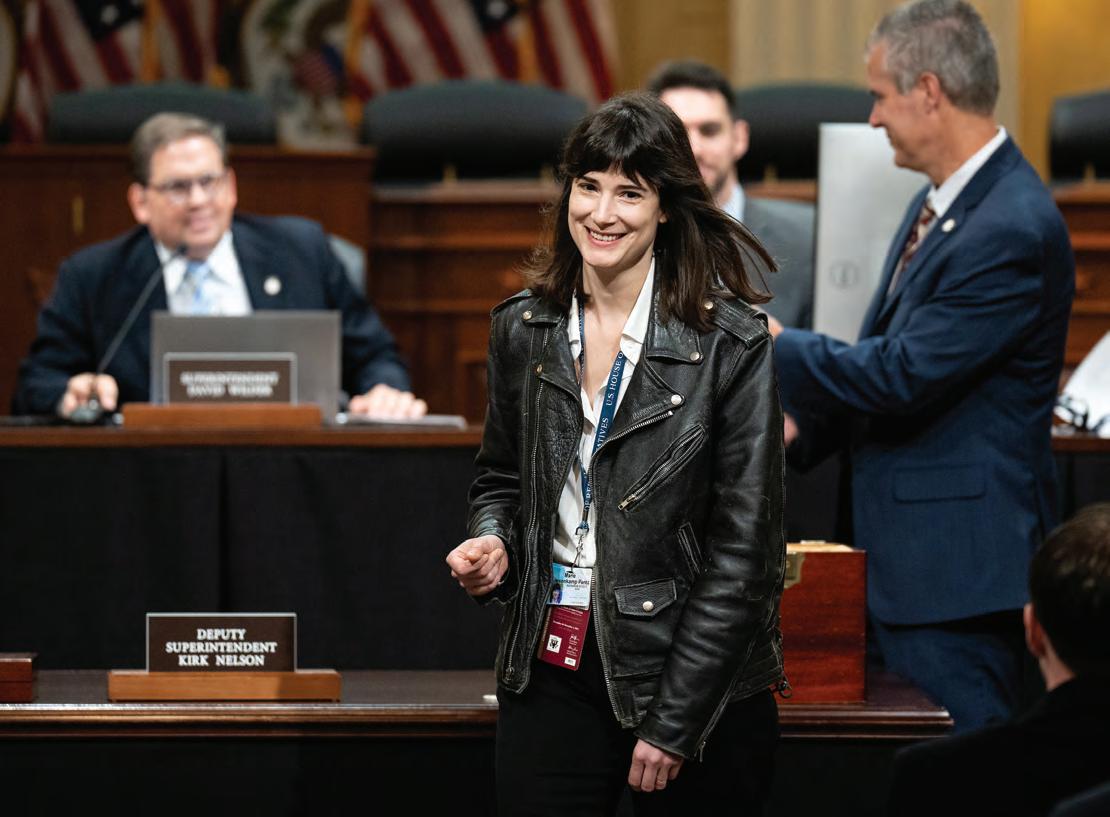
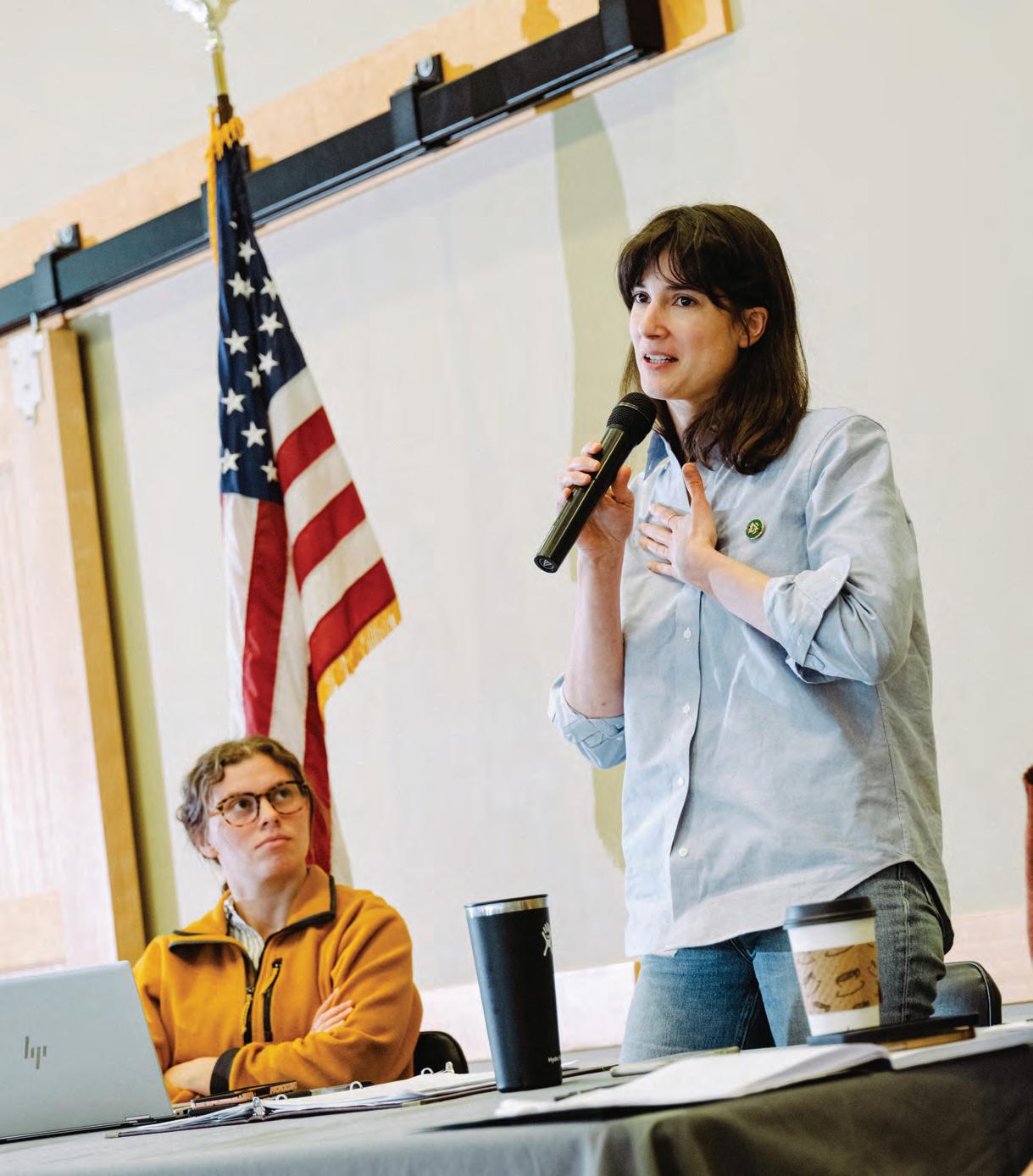
of reporting and opinion, with headlines like “A New Voice for Winning Back Lost Democratic Voters”).
When we finally got to have our interview, we lamented the paradox facing underdog candidates: you need a critical mass to get people to pay attention, but how do you gain that critical mass? Gluesenkamp Perez credits the support of her local community for believing in her at the beginning: “You just work your phone book, and go from there.”
One connection led to another, and once she had an audience, her message—of supporting working families, championing small business owners, ensuring abortion access, investing in clean energy, and increasing education in the trades—resonated. Her platform leaned centrist, which may have helped appeal to Republicans who weren’t sold on Kent’s extreme views. And surely, so did her earnestness as a regular, small business–owning mom. Without coaching or party pressure, she was able to talk about what was meaningful to her and people in her district. In interviews, she speaks candidly and passionately, often interjecting a curse or a quip into a serious remark. She’s shared personal stories during her campaign of her own economic hardships and a previous miscarriage before having her son.
After seeing Gluesenkamp Perez give her stump speech, Love was impressed by her authenticity. “That’s when I was like, if more people can see her do this, she could really win this thing,” Love said. Love worked on the campaign in a small role, helping organize several rallies and field events to harness a swelling of grassroots support. “The first event was unlike anything I’ve seen,” she said. There weren’t many traditional party activists; instead, attendees included firsttime volunteers, first-time voters, and people who just wanted to meet Gluesenkamp Perez after reading about her.
Gowen joined the campaign during the summer as one of two staff members, with no prior political experience (Gowen previously owned a prepared foods store in Portland, Oregon).

Other Reed alumni also pitched in for the campaign. David Azrael ’13 assisted with social media; Sandeep Kaushik ’89 was campaign spokesperson. Washington First District Congresswoman Suzan DelBene ’83 has been a “huge supporter,” according to
Gluesenkamp Perez. Notably, DelBene was the only member of Congress who endorsed Gluesenkamp Perez before the top-two primary election in summer 2022.
The campaign involved long, tough days. When she won, Gowen said, “We were all exhausted.” But in the face of the damning election predictions, the moment felt monumental to the tiny team. “It was one of the highlights of my life,” said Gowen. “It was a crazy thing that no one thought we were going to do.”
Gluesenkamp Perez was sworn into the 118th Congress on January 7, 2023. Now, six months into Congress, she’s been appointed to the Small Business and Agriculture committees. Having won, she said she doesn’t feel beholden to vote on party lines. “The things that feel small and unimportant to a lot of national players are the things that are really meaningful to everyday people in my district,” she said.
Instead, she wants to focus on serving her constituents—she doesn’t hide from them. She’s been holding town halls over recent months, something her predecessor, Jaime Herrera Beutler, failed to do. Some politicians are wary of hosting in-person meetings after former Arizona Representative Gabby Giffords was shot in 2011; Gluesenkamp Perez likes to remind people that she owns a gun (defense of the Second Amendment is part of her platform). The town halls have been going “shockingly well,” she said.
Gluesenkamp Perez has to balance national priorities with local ones, and some of her bipartisan votes so far have raised eyebrows—or backlash. She has joined as a co-chair of the moderate Blue Dog Coalition, and as we were sending this piece to press, she was one of two Democrats to vote in favor of a resolution to block President Biden’s student debt forgiveness plan. (At time of writing, the Senate had passed the bill and President Biden had vetoed it; the Supreme Court is expected to rule on the plan this summer.) Her statement via Twitter felt like a red herring: it demanded dollar-for-dollar investment in trades education before she would support debt forgiveness. The tweet was ratioed (which means it received more negative replies than likes), with replies criticizing her and expressing hope that she gets challenged in the 2024 primary.
I remarked to my editor that the longer we waited to publish the piece, the more time Gluesenkamp Perez had to take important or controversial actions that we would need to address. But of course, this is the point of being a politician—to take a stand— and the challenge of writing an early-career profile. Gluesenkamp Perez didn’t run a typical campaign. She is not your typical congressperson, and she won’t do typical things. She’s still a developing story.
It seems that Gluesenkamp Perez has never been one to ask for permission, or follow a conventional path. “She definitely gave our parents more gray hair than I did,” said Philip Perez, the congresswoman’s brother. The youngest of four, Gluesenkamp Perez grew up in Houston, Texas. Her father was a pastor in an evangelical church, and the family was involved in the church growing up. Her parents leaned politically and religiously conservative. Gluesenkamp Perez credits the exposure with helping her feel open around all kinds of people. She and her siblings were home-schooled by their mom for their early education, and their parents instilled an appreciation for intellectual curiosity and open-mindedness. “It was important to question things, think about things, and find out the answer for yourself,” said Philip Perez of their upbringing. The kids often spent summers in Bellingham, Washington, hanging out in their grandfather’s carpentry shop and gaining an appreciation for the woods around them. Gluesenkamp Perez comes from a long line of loggers on her mother’s side. “Even as a child the trajectory I saw for my life was living back home in Washington,” she told me. “So after graduating [from Reed] there was no real question that I’d remain up here.”
After graduating from high school, she spent a semester at Warren Wilson College, known for its focus on work and service, before discovering Reed. Her parents stopped paying for tuition when she stopped going to church. “Afterwards, I worked three jobs and paid for Reed by the credit hour; working as a nanny, barista, and in an iPhone case factory,” she told me over email.
At Reed, Gluesenkamp Perez was a thoughtful, creative student who was active in campus life, a member of Student
Senate—and who had a reputation for being down for anything, especially if it involved helping someone. One of her legacies at Reed is a memorial bench that sits in front of the Paradox, made from half of a fallen Doug fir tree on campus. When her boyfriend died before she graduated, she and his friends made the bench to commemorate him and other deceased Reedies. She rallied more than 40 students and faculty members to help haul and saw the 100-yearold tree during finals week in 2012. After 12 hours of pulling a two-man misery whip saw, they cut through. “What has shaded Reed for the past century will hopefully continue to serve its students for the next 100 years,” wrote Reed Magazine at the time. I stopped by the Paradox this spring and took a seat on the bench, stretching my legs all the way out across its width. It feels smooth and
I was the comanager of the bike co-op, and he was working as a mobile mechanic,” she said. “That was a place for us to bond and gave me a sense of freedom and agency that comes from being able to take care of your own shit.”
She looks back with some humor at trying to teach practical skills like bike repair to Reedies who embraced a life of the mind. “I will literally never forget trying to teach a physics major how to hold a wrench,” she said of working at the bike co-op. “That really throws into relief where this sort of liberal arts education begins and ends.”
Since her swearing in, she has made disparaging comments about higher education, including tweeting that “the system needs a total overhaul” before she would back student loan forgiveness. With her dogged support of working families, it sometimes seems
cool, a little worn. Sitting on it, you feel held.
It’s fitting that Gluesenkamp Perez left such a practical monument behind. Ten years into co-owning an auto shop, she champions the trades, and investment in technical education, over getting a college degree. Yet she appreciates her liberal arts education and certainly worked hard to get it. She was driven by a desire to prove herself. “I felt a four-year college degree would serve as some form of validation,” she said.
As an economics major, her thesis interrogated the effectiveness of Portland’s composting system. Advisor Prof. Noelwah Netusil [economics] was struck by Gluesenkamp Perez’s measured approach. “[It was] a very insightful, sophisticated question for someone to be asking, because you can imagine a lot of people being like, of course, it’s good,” Prof. Netusil said. As it turned out, when the program was getting started, Portland lacked the infrastructure to process the compost locally; instead, they were driving it to the Canadian border, leading to increased emissions.
A highlight of her time at Reed was managing the bike co-op; the experience helped spark an interest in right-to-repair legislation. “When I started dating my husband,
like she is pitting people who work in the trades against those with college degrees. Yet when asked for further comment on her statement, she provided an 850-word response with much more nuance. (The response was later sent to her campaign email list with the subject line “This is why I’m in Congress.”) She disagrees, essentially, with the classism higher education can perpetuate, and said changing perceptions of people without college degrees was a major motivator to run for Congress. “When I say the higher education system needs a total overhaul, I mean that we need one that costs less and provides more opportunities for different types of education in different types of fields,” she said.
Gluesenkamp Perez credits Reed with helping her learn to defend her ideas, and appreciates the value that students placed on hard work (even if it sometimes felt obsessive). “When I was at Reed you weren’t indoctrinated, you were given tools for analyzing what’s in front of you,” she said. She felt her background gave her a different perspective than many students, but she wasn’t afraid to engage with them. “I’m comfortable talking to people when we don’t agree about issues, or we don’t have the same worldview.”
“It’s really powerful to have a background in critical analysis and argument, but also, what’s the reality going on around you?” —Marie Gluesenkamp Perez ’12
It’s clear that Gluesenkamp Perez doesn’t believe a liberal arts education should be branded as superior to a trade education, but also that she has benefited from experiencing both. “There’s something to the stochastic art of being a mechanic,”she said. “I could write the best essay about the car being fixed. If it doesn’t run, it doesn’t run.” Still, she keeps books from classes with Prof. Netusil and Prof. Jan Mieszkowski [German], her Hum 110 professor, in her office. A marriage of intellectual curiosity with pragmatic, hands-on experience is ideal in Glusenkamp Perez’s view: “It’s really powerful to have a background in critical analysis and argument, but also, what’s the reality going on around you?” She is a rare politician that embodies that duality in Congress, keeping a foot—or a hand—in both worlds.
In the car between stops during our tour, Gowen passed back a press release on the mifepristone ruling for Gluesenkamp Perez to approve. (The drug, which is widely used for medical abortions, is the subject of a Supreme Court case about its continued availability after a preliminary overturning of FDA approval. At time of writing, the FDA still approves access for it.)
Gluesenkamp Perez had a 103-degree fever when news about the overturning broke. She simply quote-tweeted an announcement from Planned Parenthood with the word “Bastards.”
Now, she was polishing up a more formal response. The response included mention of her work to reintroduce the the Protecting Reproductive Freedom Act, which gives the FDA authority over abortion medications. She credits her “amazing team” for helping her prioritize what to focus on. Though her staffers were focused and professional, they had the conviviality of a band on tour: they chatted about roofing, the importance of oil changes, and rent prices throughout the ride, sharing chips and jokes in between briefings. It was a little jarring to swing from the silly to the serious so many times. When I asked Gluesenkamp Perez how she kept up with it all—keeping a pulse on both national and local issues while going through her daily life—she simply said, “It’s crazy.”
As dazzled as I was by watching Gluesenkamp Perez move with surety through a dizzying amount of interactions and decisions, I had to remind myself that
I was witnessing her on just one day—and it seemed like a good one. I asked if she had disappointed people yet. Had she made anybody mad? Yes, she said, and trailed off. She told me that she asks her advisors all the time if they are overpromising people. She shared an anecdote about a pair of Afghan pilots who visited her office to ask for help bringing over their families, who had been living in hiding from the Taliban for 18 months. The pilots looked “skeletal,” with bags under their eyes. She couldn’t do anything; the Afghan Adjustment Act, which would provide a path to residency for Afghans who helped the U.S., is stuck in the Senate. “We promised them,” she said. “That was really difficult.” She’s also spoken to a grief counselor for help on processing the emotional whiplash of being a congressperson, and “how to be with people on a human level, because it’s not just political.”
Beyond being a new politician, Gluesenkamp Perez is a relatively new mom. When I asked how she balanced family life with her new job, I appreciated her realistic answers to my questions, though they were hard to hear: there isn’t balance. There are choices. She prioritizes mornings with her son, and works at night after putting him to bed. On our tour day, she told me that her husband had asked her to stay home for the first time that week, when he and Ciro were sick. She had a scheduled meeting with veterans who would travel from all over the state to see her. She kept the meeting. “That was a low point for me in this whole thing,” she said, “that I couldn’t stay home.” Gowen interjected that Perez had been showered with praise for the meeting by commissioners and mayors who don’t typically support Democrats.
“So it was worth it,” Gowen said.
“I mean—” Gluesenkamp Perez paused. “You have to ask my husband if he thinks it’s worth it.” Sundays, at least, are for family.
Gluesenkamp Perez keeps moving forward: she’s already campaigning for 2024. Beyond making waves within the party, her win is inspiring people to consider how to get involved in their own neighborhoods, in their own ways. “My students were following her election very closely,” said Prof. Netusil. “I think she has inspired the current Reed students to pursue careers in public policy or to get involved in their communities, whether that’s the school board, volunteer
work, or running for elected office. They’re like, wow, she graduated 10 years ago, and she’s in Congress.”
Speaking to Gluesenkamp Perez a few months into her term, it’s hard to tell if she has enough distance from her own congressional win to advise others on how to pull off what she did. She still shared some thoughts for people looking to enter politics that were both simple and daunting. “Do what you’re good at, and do what you love, and be useful to your community,” she said. Most importantly, don’t wait for an approval or endorsement to act. “No one is going to give you permission to run,” she said, with a bit of an edge to her voice.
Gluesenkamp Perez’s story might help rewrite the larger narrative of who can win a federal election, and which campaigns deserve attention. “I do feel like we’ve sort of carved this new path and changed the conception of who can get elected and how elections can work,” she said. “And I’m very proud of those things.”
Prof. Netusil recalled a discussion in an econometrics class about the statistics of Gluesenkamp Perez’s predicted chances of winning after FiveThirtyEight, a prominent polling and political website, gave her that two percent chance. Forecasting, Prof. Netusil told her students, can be wrong. “They don’t know Marie like I know Marie,” she said. “And if anyone would have beaten those odds, it would have been Marie.”

Good poetry is meant to be disruptive. Subversive and indigestible, it enters the cultural bloodstream as a corrosive irritant. Resistant to containment and mass assimilation, it endures on its own terms like the timeless verses of Shakespeare.
So declared Kenneth Rexroth, leader of the San Francisco Renaissance literary movement. In the early 1950s, he welcomed into his North Beach circle three aspiring poets fresh out of Reed College— Lew Welch ’50, Philip Whalen ’51, and Gary Snyder ’51. Under Rexroth’s tutelage, the trio began waging their own poetic assaults on America’s post-war materialistic appetite.
Crossing paths with Allen Ginsberg and Jack Kerouac, they found themselves earmarked as the Beat movement’s West Coast wing. It was a pigeonhole Snyder, for one, sought to evade. By the time the movement morphed into the innocuous beatniks, he had embarked upon a 10-year sojourn to Japan, immersing himself in Zen Buddhism, haiku, and Chinese poetry.
Combining those Asian influences with his undergraduate studies in the classics, modern literature, anthropology, and Native American mythology, Snyder was able to forge a fresh and original way of looking at the world, one that fostered one of the most singular and distinctive voices in modern poetry.

Last year, the 93-year-old Snyder was honored by the Library of America, who published his collected poems in their preeminent book series of prominent poets and writers. In celebration, a tribute was held, featuring testimonies from various distinguished literati.
After expressing his gratitude for the accolades, Snyder pointed out that his social anarchism, which views liberty and social equality as interrelated, had been largely overlooked. Its influence on his work, he said, was “not quite unspoken but very subtle often, or simply assumed in directions and spirits.”
It was a gentle reminder that there is nothing safe about a Gary Snyder poem.
Beneath the common speech-patterns and close, intimate attention to natural imagery, his poems elicit a complex interaction, resonating with the reader, consciously or unconsciously, on multiple levels. That Coyote— the slippery, wily trickster who warily keeps his distance from civilization was a favorite Native American archetype during his studies at Reed should come as no surprise.
The allure of Snyder’s poetry begins with the language itself. He cites Ezra Pound, a strong lyricist with an ear for words, as the first poet to truly speak to him. Similarly, Snyder’s cadence is crisp and clear. He lays down familiar terms in unfamiliar juxtapositions with rhythms borrowed from hand work. The approach is spelled out in his poem “Riprap,” a term he defines as “a cobble of stone laid on steep, slick rock to make a trail.”
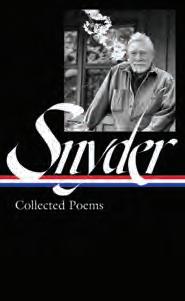
Before your mind like rocks. placed solid, by hands.
In choice of place, set
Before the body of the mind in space and time:
Solidity of bark, leaf, or wall riprap of things
The “things” in a Snyder poem are largely drawn from the physical landscape. Finely distilled, they radiate a translucency easily mistaken for simplicity. But beneath their surface simplicity lies a terrain of unsettling depths, as in the poem “Piute Creek,” where a panorama suddenly coalesces with deep time:
Hill beyond hill, folded and twisted
Tough trees crammed
In thin stone fractures
A huge moon on it all, is too much.
The mind wanders. A million
Summers, night air still and the rocks
Warm. Sky over endless mountains.
All the junk that goes with being human
Drops away, hard rock wavers
After returning from Japan in the mid-’60s, Snyder settled with his wife and two children among a community of backto-the-land Zen aficionados in the Sierra foothills. As his general focus shifted to being rooted in place, his poetry became stylistically more emotional, metaphoric, and lyrical. It also gained relevance among those increasingly concerned with the natural world.
Because Snyder’s views are often so nuanced, drawing from a wide range of references with a timescale extending back 10,000 years, it’s possible for various schools of thought to adopt him as their own. Hence, his popular designation as “poet laureate of deep ecology.” As an environmental movement, deep ecology seeks freedom from the dichotomy of human civilization and nature by viewing humans as equal and interconnected with all other forms of life.
But Snyder is not so easily packaged. The trail he lays out toward such freedom ultimately leads into the wilds of Zen impermanence and emptiness.
“To be truly free,” he writes, “one must take on the basic conditions as they are— painful, impermanent, open, imperfect— and then be grateful for impermanence and the freedom it grants us . . . The world is nature, and in the long run inevitably wild, because the wild, as the process and essence of nature, is also an ordering of impermanence.”
His poem “Ripples on the Surface” points to the trail’s end.
The vast wild the house, alone. The little house in the wild, the wild in the house.
Both forgotten. No nature
Both together, one big, empty house.

The latest book by William R. Ware ’53 covers chronic diseases that are typically viewed as incurable. Drawing on expertise gained over 14 years of writing newsletters for International Health News, he discusses heart disease, cancer, type 2 diabetes, and more. He documents non-drug interventions that can aid prevention, delay progression, or even induce remission. (Lux & Associates, 2022)

David Coleman ’60 has written a book of memoirs about traveling the country the oldfashioned way, “riding the rails,” and the connection points among science, education, politics, and geo-relations. Distinguished Research Professor Emeritus at the Odum School of Ecology, University of Georgia, he has been exploring the upper layer of the ground on which we tread, quite literally, around the world. (Bilbo Books, 2022)

the Planet
The latest book by Bob Gottlieb ’65, professor emeritus at Occidental College, presents a framework for creating a more just and equitable carecentered world. He examines how a care economy and care politics can influence and remake health, climate, and environmental policy and the institutions and practices of daily life. (MIT Press, 2022)

A new book by John Daniel ’70 is a varied meditation made of 382 haiku-like three-line stanzas and 11 brief passages of prose. The work began as a loose haiku journal of a year spent in the sagebrush and juniper country of south-central Oregon. John says, “I found myself sketching a kind of cosmic creation story, based on my reading in science and philosophy as well as my own hunches and spiritual inclinations.” (Broadstone Books, 2023)
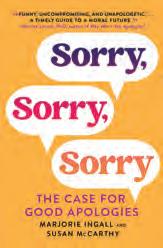
Marjorie Ingall and Susan McCarthy ’77 draw on research in psychology, sociology, law, and medicine to explain why a good apology is hard to find. Alongside their six (and-a-half)-step formula for apologizing, they delve into how to respond to a bad apology; why corporations, celebrities, and governments seldom apologize well; how to teach children to apologize; and how gender and race affect both apologies and forgiveness. (Galley Books, 2023)

Monica Wesolowska ’89 has published the tale of a mother who supports her son from the moment he floats into the air and doesn’t come down. This story for kids offers themes of difference, unconditional love, and transcending bigotry to find our place in the world. The New York Times said, “This effervescent parable of a floating boy, about rising above when others want to keep you down, is whimsical and relatable, thanks to Wesolowska’s warm anecdotal language and [illustrator Jerome] Pumphrey’s lighthearted art.” (Dial Books, 2023)
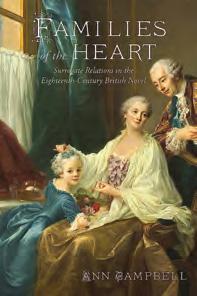
Ann Campbell ’94 upends a traditional trope— the model of hierarchical family—and in doing so offers refreshing analysis of canonical British novels. She explores the concept of surrogate family as a signal of cultural anxieties about young women’s changing relationship to matrimony at that time. A professor of English at Boise State University, Ann argues that female protagonists in these works assemble chosen families rather than families of origin as a means of exploring the world and themselves, preparing for idealized marriages, or sidestepping marriage altogether.
(Bucknell University Press, 2022)
In her first full collection of poetry, Sarah Barnsley ’95 explores manifestations of intrusive thoughts as part of obsessive-compulsive disorder before navigating through the twists and turns of recovery and love. A winner in the Poetry Society’s “Members’ Poems” competition in 2021 and 2018, she is senior lecturer in English and American literature at Goldsmiths, University of London. Her earlier work focused on modernist poet Mary Barnard ’32, and in Mary Barnard, American Imagist (2013), she examined Barnard’s poetry and poetics in the light of her correspondence with Ezra Pound. (Smith | Doorstop Books, 2022)
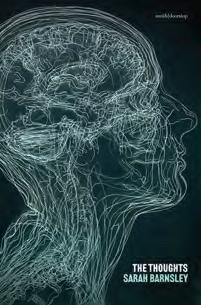
Heidi Duckler Dance: 2016-2021
Heidi Duckler ’74 has published a visual compilation book of her dance company’s works from 2016 to 2021. She is the founder and artistic director of Heidi Duckler Dance in Los Angeles and Heidi Duckler Dance/Northwest in Portland, Oregon. Deemed the “reigning queen of site-specific performance” by the LA Times, she is a pioneer of site-specific, place-based contemporary practice. (Independently published, 2022)
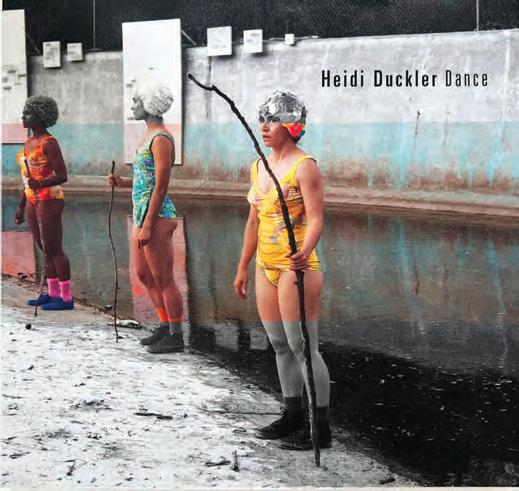
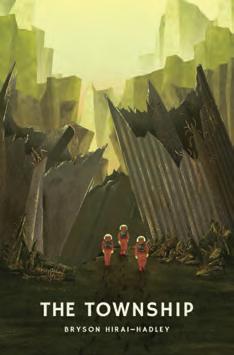
Bryson Hirai-Hadley ’04 has written a novel about the struggle for survival in the 23rd century. After runaway global warming has led to a climate apocalypse, technician Jacob Watz ventures outside to maintain cooling systems and oxygen generators in the toxic atmosphere. One day a mysterious explosion makes him question whether the Township really is the only remaining human settlement— and if it has any hope for survival.
(Independently published, 2022)
Beth Reddy ’05 takes readers on a journey into the world of Mexican earthquake-risk mitigation in her new book. Drawing on ethnographic fieldwork and archival data, she conducts a qualitative analysis of controversial earlywarning technology and considers the requirements and uses of the alert system. Beth is assistant professor of engineering, design, & society at the Colorado School of Mines, with a joint appointment in geophysics. (MIT Press, 2023)
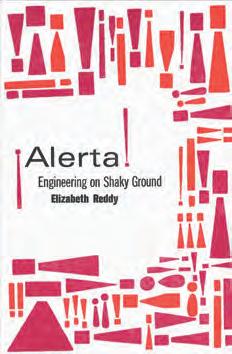

Amy Foote ’00 edited a feature-length documentary (her 14th!) that was nominated for an Oscar at the 2023 Academy Awards. The film won the top prize at the Venice Film Festival in 2022 and an Independent Spirit Award earlier this year. It chronicles the life of rebel photographer Nan Goldin and her fight against the billionaire Sackler family and their opioid business, Purdue Pharma. David Velasco ’00, now editor in chief of ArtForum magazine, is interviewed in the film. (HBO Max, 2022inf)

Don Berg MALS ’12 has received national recognition for a book combining a scientific model of motivation and engagement, self-determination theory (SDT), with an analysis of successful holistic education. A psychological researcher, Don is concerned with the primary human needs of autonomy, competence, and relatedness, and he argues that the central problem in schools has less to do with academic instruction and more to do with the psychology of learning. (Publish Your Purpose, 2022)
Los Angeles Bungalow Architecture
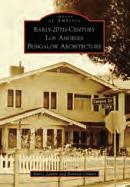
Ethics and Time in the Philosophy of History: A Cross-Cultural Approach
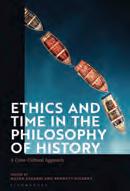
Bennett Gilbert MALS ’12, assistant professor of history and philosophy at Portland State University, has two new publications to share. The first was cocreated with photographer Harry Zeitlin and shows how Los Angeles shaped the nation’s culture in the 20th century with its bungalow style of middle-class housing. (Arcadia Publishing, 2022) The second book is an interdisciplinary volume coedited with a colleague, Natan Elgabsi, and it connects the philosophy of history to moral philosophy with a unique focus on time. (Bloomsbury Academic, 2023)
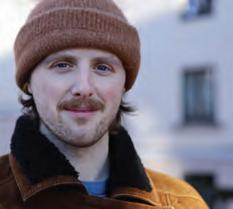
(tr. Notices from The Paris Commune)
Composer John Andrew Wilhite-Hannisdal ’13 penned an opera written after a libretto by Norwegian dramatist Finn Iunker based on newspapers, letters, and other texts published by the Communards in the days leading to the bloody end of their revolution. It is a meditation on democracy, collective responsibility, and the place of the voice in all of this. The work premiered at the Norwegian National Opera in fall 2022.

Prof. Peter Steinberger [political science] has published Rationalism in Politics, in which he engages with major proponents of post-Kantian thought, analytic and continental alike, to show how political judgment and political action are grounded in considerations of human reason. Arguing against emergent and even dominant tendencies of recent political thought that emphasize the so-called primacy of affect, he challenges political theorists to take account of important themes in philosophy on the topic of human rationality. With a focus on influential arguments in the philosophy of mind and the philosophy of action, he seeks to reanimate the close connection between systematic philosophical speculation on the one hand and the theory and practice of politics on the other. (Cambridge University Press, 2022)
Adela Zamudio: Selected Poetry & Prose

Lynette Yetter MALS ’21 translated works from the Spanish and was a finalist for the 2023 PEN Award for Poetry in Translation. This is the first book in English showcasing the life and writings of Bolivia’s celebrated writer and educator Adela Zamudio (18541928). Lynette’s explorations grew out of her thesis for Reed’s master of arts in liberal studies (MALS) degree, “Domination and Justice in the Allegorical Story ‘La reunión de ayer’ by Adela Zamudio (1854–1928), Bolivia.” (Fuente Fountain Books, 2022)
And, in case you missed it, in 2018, Steinberger wrote a guide to the literature on political judgment as part of Polity’s Key Concepts in Political Theory series. What exactly is good judgment in politics? How is good judgment acquired, and how can we recognize it in others? This textbook, Political Judgment , addresses such questions by considering important developments in the history of political thought—ancient, modern, and contemporary—and introducing readers to ongoing debates about the idea of prudence or practical wisdom as it functions, or should function, in the realm of public affairs. (Polity, 2018)
These Class Notes reflect information we received by June 15. The Class Notes deadline for the next issue is September 15.
While a Reed education confers many special powers, omniscience is unfortunately not among them; your classmates rely on you to tell us what’s going on. So share your news! Tell us about births, deaths, weddings, voyages, adventures, transformations, astonishment, woe, delight, fellowship, discovery, and mischief.
Email us at reed.magazine@reed.edu. Post a note online at iris.reed.edu. Find us on Facebook via “ReediEnews.” Scribble something in the enclosed return envelope. Or mail us at Reed magazine, Reed College, 3203 SE Woodstock Blvd, Portland OR 97202. Photos are welcome, as are digital images at 300 dpi. And don’t forget the pertinent details: name, class year, and your current address!
EDITED BY JOANNE HOSSACK ’821951
Robert Richter is credited as coproducer and was the original director of the documentary film American Justice on Trial, about the Huey Newton trial and the constitutional guarantee of a jury of one’s peers, which was on the Oscar shortlist announced last December. Here’s one way to see it: https:// vimeo.com/694733653 (password: AJOT_1968).
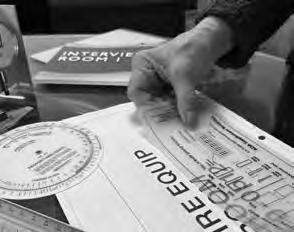
1953 70TH REUNION
William R. Ware helps you beat the odds with his latest book. (See Reediana.)
1958
Congratulations to Sharon Chapin Toji, who was chosen by Signs of the Times magazine as one of its five 2023 Women in Signs awardees. Sharon is currently the oldest member of the American National Standards Institute (ANSI) A117.1 Committee, which writes all the standards for architectural accessibility that form the basis of the ADA standards. Sharon was recently appointed chair of a new task group on accessible communications in the built environment, which is intended to carry on a major overview of the ANSI standards that will reach into the next cycle and possibly will not be published until about 2030. “Since by then I will be
94, it will be interesting to see if I will be around to celebrate!” Currently, the most controversial proposals are those authored by Sharon that would establish measurable contrast standards for signs, stair striping, and detectable warning surfaces. She asks that anyone with a vision impairment or who is legally blind but uses vision to find their way join the special contrast subgroup as an interested party to help develop the contrast standard. Let her know at ADASignLady@gmail.com.
1959
The 10 p.m. curfew for women?
1960
Dave Coleman has written a book of his memoirs, with several anecdotes from his four years of being a Reedie. (See Reediana.)
1961–62
And bring your guitar . . .
1963 60TH REUNION
Playing Empire? (Is it true that individual games could last years?)
1964
Communists for Goldwater?
1965
In his new book, Bob Gottlieb presents a framework for creating a more care-centered world. (See Reediana.)
1966
The 11 p.m. curfew for women?
1967
In 2022 Joanne D’Antonio was appointed by her city council member (and confirmed by city council and the mayor) to be a representative to the Los Angeles Community Forest Advisory Committee, after serving two active years as alternate representative. In 2016 Joanne founded (and continues to chair) the Neighborhood Council Sustainability Alliance Trees Committee, which is committed to the protection of the city’s urban forest and has members citywide. Joanne’s unstoppable
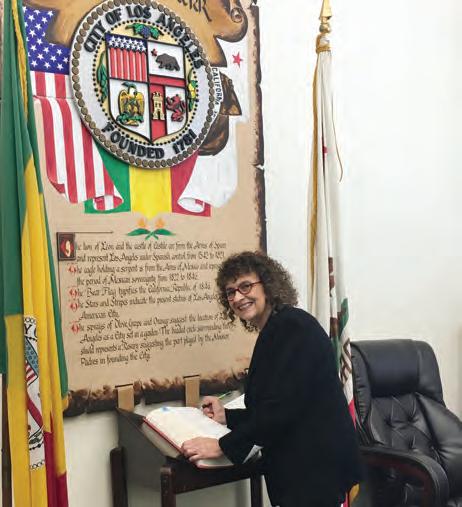 Joanne D’Antonio ‘67 is sworn in as alternate representative to the Los Angeles Community Forest Advisory Committee in 2019. (In 2022, when she ascended to full representative status, she was sworn in virtually.)
Joanne D’Antonio ‘67 is sworn in as alternate representative to the Los Angeles Community Forest Advisory Committee in 2019. (In 2022, when she ascended to full representative status, she was sworn in virtually.)
commitment began in reaction to the city’s Urban Forestry Division overpruning and topping the 75-foot sweetgum street trees outside her window in 2014 and continues as a movement for tree preservation and native planting. She was quoted on the front page of the LA Daily News on November 21 with this message for the new mayor: “What I would like her to do is to commit to a vision for trees . . . and not think ‘We can just replant. It takes a long time to replant, to get a big tree—20 years. . . . Whether she (states) this publicly . . . more important is what she does than what she says. . . . I just want her to have trees in her vision and her consciousness.”
John Cushing played at a contra dance at Oaks Park Pavilion with the Portland Megaband. He was one of 63 musicians playing for 300 dancers.
At the start of the pandemic, Sheila Klatzky went back to her Reed roots and started a research consulting company, KPFC, to provide data for impact and insights for action to businesses and nonprofits. Sheila recently presented at the launch event for the 2022 Report on the Status of Women in Westchester, of which she was the author. She also authored the forthcoming Asian
Americans in Westchester report on behalf of Westchester County, New York.
1968 55TH REUNION
John Mason has retired to Colorado after working 34 years as a prosecutor in Seattle. “I love living in the mountains and have climbed all the 14ers.” Good on you, John!
1969
Reed celebrates second (?) Renaissance Faire (we know you’ll correct us if we’re wrong.)
1970
John Daniel’s new book of poetry was published in April. (See Reediana.)
1971
Diane Rosenbaum was sworn in as Multnomah County Commissioner for District 3 (which includes Reed) on January 4. She replaced Jessica Vega Pederson, who vacated the position when she was elected county chair. Diane caps a long career in public service that includes 18 years in the Oregon legislature, serving in numerous leadership positions
including House Speaker Pro Tem and Senate Majority Leader.
1972
Events we’re sorry we missed, no. 1: April 2, benefit dinner in Anna Mann to send radicals to the state Democratic convention. $1 for food and 25 cents a glass for drink. (Did you go? Did they make enough money?)
1973 50TH REUNION
Events we’re sorry we missed, no. 2: March 25, “Social—Sponsored by the Feminists and the Gays.” (Did you go? Who danced better?)
1974
Heidi Duckler ’s dance company has launched a visual compilation book of the company’s works from 2016 to 2021. (See Reediana.)
Elliot Krane finally retired May 1 after three decades on the faculty of Stanford University School of Medicine. Now on to bigger and better things! On another note, Reed College has joined the pantheon of great sports schools at Elliot’s neighborhood barbershop. “I simply couldn’t keep sitting there in the
clockwise from top-left
Diane Rosenbaum ‘71 at her swearing-in as Multnomah County Commissioner.
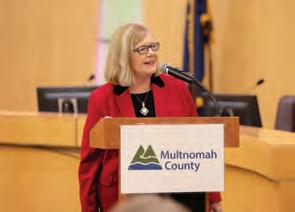
Presenters at the launch event for the 2022 Report on the Status of Women in Westchester included Sheila Klatzky ‘67 (sixth from left).
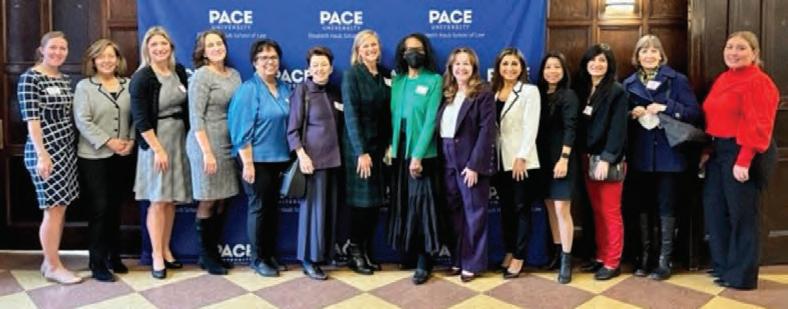
It’s blue Colorado skies for John Mason ’68.
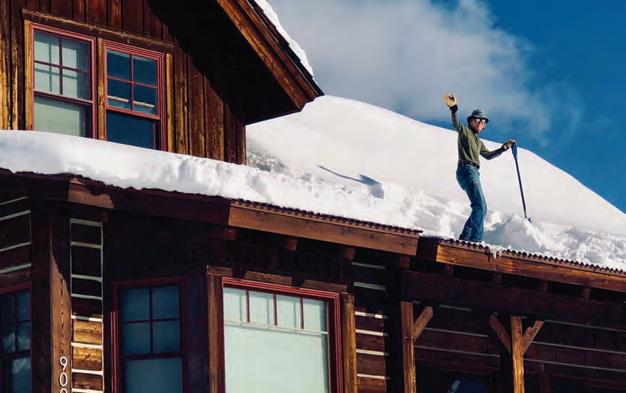
Behold the mighty Griffin at the neighborhood barbershop of Elliot Krane ’74.
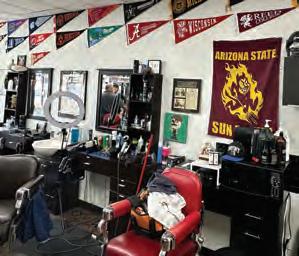
Three from ‘75: Alison Baker, Cecilia Roque, and Katrina Kelner celebrate a 50-year friendship under the river birches.

barber chair without the pleasure of seeing my alma mater.”
Three women from the class of ’75 have been found alive and well and living it up on the East Coast. Cecilia Roque hosted classmates Alison Baker and Katrina Kelner at her home in the town of Bellport, New York, in late winter. A weekend of conversation about travel, grandchildren, dogs, men, and movies culminated in a delightful evening of baked chops, bees’ knees, and a visit from some charming young police officers, one of whom expressed the hope that some of his friendships, too, would last for more than 50 years. “Surely there are more of us extant.”
Congratulations to Ken Jacobson, who received the E.B. Hershberg Award for Important Discoveries in Medicinally Active Substances from the American Chemical Society this spring. Ken received the award “for original and high-impact research in structure-based medicinal chemistry, including the discovery of G-protein receptor modulators in clinical trials.” Ken notes that he is the 17th recipient and the first government employee to receive the award. “Most of the other recipients have discovered widely used pharmaceuticals, for example Lyrica. I have four drug molecules currently in clinical trials, including phase 3, but none have been approved yet as new drugs. I work on a receptor-signaling system in the body that has relevance to many different diseases. I love to talk about it.”
Lauren Wiener has relocated! “After decades of being Portlanders, Roger (Hart) and I have moved to Port Townsend, Washington, to take new hikes, see new birds, make new friends. Would love to hear from any Reedies passing through or living in the area.”
Mariah Evans retired from teaching at the University of Nevada, Reno, and became a grandmother in 2022. Mariah’s recent publications include “Diversity in Religiosity Undermines Conventional Personal Morality across the Globe: Evidence from 90 Nations, 300,000+ Individuals” in Journal for the Scientific Study of Religion; “Concise Survey Measures for the Big Five Personality Traits” in Research in Social Stratification and Mobility; “Sympathy, Blame, and Just Allocation of Health Costs Entailed by Risky Conventional Lifestyles” in Advances in Social Science and Culture; “Happily Distant or Bitter Medicine? The Impact of Social Distancing Behavior and Preferences on Life Satisfaction during the Epidemic” in Applied Research in Quality of Life; and “Legitimate Earnings Inequality and National Welfare Commitment: Correspondence between Economic Institutions and the Pay 80,000+ People in 30 Nations Think Legitimate for Ordinary Jobs and for Elite Jobs” in Social Science Research
“The canyon and the library at Reed are two places that will stay in my heart forever. I give, in part, to help keep them amazing for future Reedies.”
—STEPHANIE GUSTAFSON ’12reed.edu/givenow
Roommates from the classes of 1976 and ’77 gathered in Jackson Hole in August 2022 at George “Mike” James’s ranch, Moondance. Attending were Raf Gurvis, Len Seifter, Art Lyford, Peter Preston, Jim O’Neill ’76, and Steve Leibovic. Activities included yoga, fly fishing, lake swimming, and lots of reminiscing by the fire. Mike says, “Wonderful karma being back together again! We all graduated and became two surgeons, two dentists, a professor, an attorney, and a Wall Streeter. All the best to our classmates and friends!! Stay in touch!”
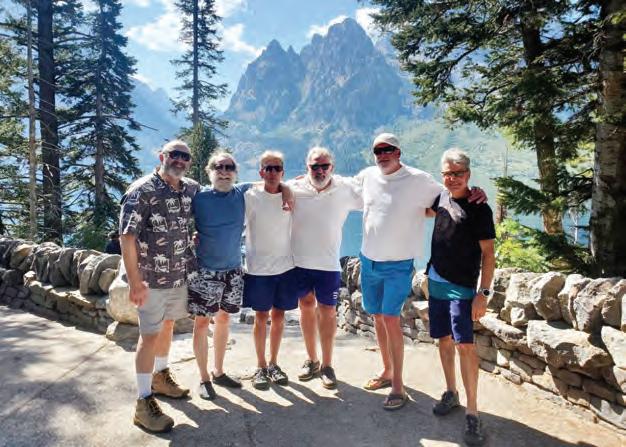
We’re not sorry to report that Susan McCarthy has coauthored a book about apologies! She wrote it with her friend and colleague Marjorie Ingall, with whom she runs an apology-analysis/humor website at SorryWatch.com. (See Reediana.)
Patrick Hadlock has retired after 38.67 years practicing law in Corvallis, Oregon. “Practiced with the same firm the whole time, I’ve been married since 1984, and I’ve lived in the same house since 1987. We just got solar panels installed and active on August 9, 2022. Argued about 40 cases in the Oregon Court of Appeals. One of my better moments was Longstreet vs Liberty Mutual Insurance. Google it. Opinion written by a fellow Reedie.”
Rob Clark and Janet Russell ’78 recently moved from the Sierra foothills (Sonora) back to the Bay Area (San Jose) due to the irresistible gravitational pull of colocated children and grandchildren. Rob is hoping to be fully retired from water quality work by summer, and Janet recently unretired to become the transitional pastor for a local Presbyterian church. Janet is also busy with San Jose Master Gardeners, and Rob is playing more guitar (worship band, old-time/ bluegrass, and English country dance).
Happy 50th birthday to home sweet home, a.k.a. the Eric V. Hauser Memorial Library.
Steven Falk returned to Oakland this spring to serve as the city’s interim chief
administrative officer while new mayor Sheng Thao gets her administration up and running.
1984
Do doves actually cry? And what does it sound like?
1985
Andreas Killen has written a chronicle of research on the brain in the 1950s. (See Reediana.)
1986
Apparently Al Capone took it all with him.
1987
Michelle Ann (Mendelson) Collins has published two books on journeying through grief. (See Reediana.)
1988 35TH REUNION
Welcome (not) to the first known PCtargeting virus, “Brain,” which infected 5.25-inch floppy disks.
1989
On January 3, 2023, Dan Cross was sworn in for his second term as judge of the Washington County Justice Court. Dan thanked the voters for granting him this honor and pledged to continue teaching daily civics lessons in his courtroom while applying the law equally to every individual.
Andy Mammen is a senior investigator and leader of the Muscle Disease Unit at the NIH in Bethesda, Maryland. Monica Wesolowska has published her third book! (See Reediana.)
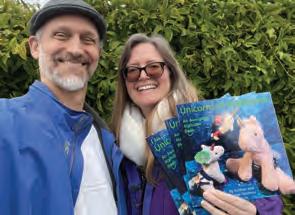
1990
Fun fact: Solitaire was originally included in early computer programs to help users procrastinate, um, we mean strengthen their clicking and dragging skills.
1991
After 10 years, Sara Levin is leaving her role as chief impact officer at United Way of King County in Seattle for new adventures. “I’ve had the privilege of leading hard work to address homelessness, poverty, and education inequities. We rose to the occasion during COVID and the racial justice uprising, and shifted to focus deeper on racial equity and systems change. I’m thrilled to be teaching part time at my MPA alma mater (Evans School of Public Policy and Governance) and plan to launch a nonprofit consulting practice in the spring. I’m excited for the change!”
1992
Happy Seventh Annual Nitrogen Day!
1993 30TH REUNION
Put a sun-dried tomato on it.
1994
Ann Campbell had a book published last fall! “This book is the culmination of years of work, and I am extremely proud of it and excited about it.” (See Reediana.)
Krishna Feldman is working at a school library, like she did at Reed. George Feldman ’95 refuses to leave kindergarten, which they now make him teach; he also teaches teachers at the Aquarium. The pair just finished their latest book, Unicorns in Underwear, a “slightly naughty” alphabet book.
Bronson James was appointed to the Oregon Supreme Court by Governor Kate Brown to fill the seat made vacant by the retirement of Chief Justice Martha Walters. Bronson was previously a judge on the Oregon Court of Appeals and the Multnomah County Circuit Court. He began his career as a public defender, then opened his own firm focusing on criminal defense, immigration, and civil rights litigation.
1995
Sarah Barnsley has published a new poetry collection. (See Reediana.)
1996
Catherine Borek, who started teaching at Dominguez High School after graduating from Reed, was honored by being named California Teacher of the Year
2023. In January, Catherine’s family, colleagues, and past students joined her for a gala in Sacramento to celebrate.
Sam Findley finally touches back in after all these years! “After a PhD at Duke, then stints at Dartmouth and Rhodes, I’ve been in central Pennsylvania teaching classics and philosophy at Penn State Altoona for years (it’s a hoot using C.D.C. Reeve’s [philosophy 1976–2001] translations and remembering his Hum 110 lectures!). Raising a seriously weird kid with my wife, training horses, running a friend’s cattle on our pastures, raising vegetables and rabbits, falconry hunting with my hawks (almost to Pennsylvania master falconer!), rock climbing, and racing bikes take up most of my time. If you’re coming through Pennsylvania on I-80, and we knew each other, feel free to stop by for a coffee!”
1997
Congratulations to Amy Ulrich Geary on her new position as senior vice president of content distribution at NBCUniversal!
1998 25TH REUNION
Reed College refuses to return U.S. News and World Report survey for fourth consecutive year . . .
1999 . . . and fifth consecutive year.
2000
Way back in summer 2014, Toby BenDor worked as a student attorney at the Michigan Law School Innocence Clinic, and, with the help of several incredible
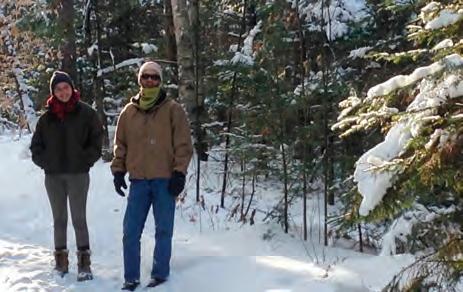
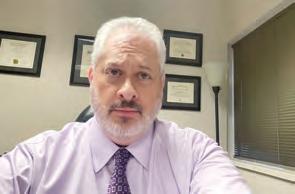
clockwise
George Feldman
and
Feldman
made an awesome alphabet book! Sam Findley ’96 and kid take a hike. Sam says the kid is “in college now, sorta.” Here’s an “action” shot in the chambers of Judge Dan Cross ’89.
Dominguez High School alumni Tayshaun Prince, Bobby Jones, and Tyson Chandler, back at DHS for their jersey retirement, take a moment with Catherine Borek ’96 to celebrate her California Teacher of the Year honor.
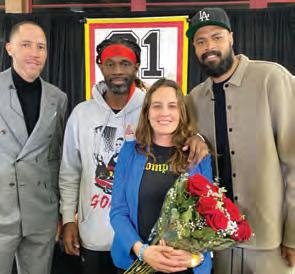 from top-left
’95
Krishna
’94
from top-left
’95
Krishna
’94
faculty and students, seven inmates have been fully exonerated from Toby’s former assigned cases. Toby worked for the Toledo Law School from 2013 to 2016, earning his JD there in 2015. He has recently worked for a local government in Michigan.
Amy Foote edited the documentary All the Beauty and the Bloodshed, which was nominated for an Oscar at the 2023 Academy Awards. The film won the top prize at the Venice Film Festival in 2022 and an Independent Spirit Award earlier this year. It chronicles the life of rebel photographer Nan Goldin and her fight against the billionaire Sackler family and their opioid business, Purdue Pharma. Amy’s classmate David Velasco , now the editor in chief of Artforum magazine, is interviewed in the film, which began streaming on HBO Max in March. All the Beauty and the Bloodshed is Amy’s 14th feature-length documentary. Over the years, Amy has won an Emmy and a Tribeca Festival Jury Award for editing, and has been nominated for a Cinema Eye Honor and an ACE Eddie Award for editing. Films edited by Amy have won a Peabody, a James Beard Award, and multiple jury prizes and audience awards. Amy lives in Brooklyn with her wife, the songwriter/musician Ana Egge, and their daughter, Roxy. (See Reediana.)
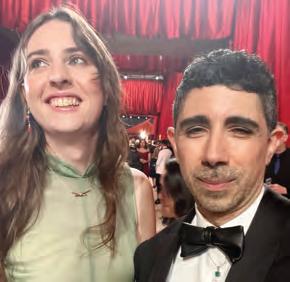
Did the 21st century begin this year or last year? Let us know if you noticed anything.
Sarah Boddy Norris is being represented by the North Carolina ACLU in a lawsuit against the City of Asheville, which banned Sarah and 13 other mutual aid organizers from all city parks for three years in violation of several key bits of the Constitution. The organizers were “I’ll always take an opportunity to support Reed College, an institution that changed my life in so many positive ways.”
—SARA LEVIN ’91reed.edu/givenow
charged with “felony littering” after an art-based protest, a charge the group has been fighting in court since January 2021. It’s a whole thing and you can follow along at https://sanctuarycampde fendantupdates.substack.com/.
Hannah Robbins writes, “I am still teaching in the math department of a small liberal arts college in Virginia, where I recently quipped to my class that I just have a feeling about certain equations because ‘I’ve been teaching calculus for like 20 years . . .’ and then counted up and realized that was actually true! Luckily, while I can now pass for a responsible adult, I’m still a happily wacky kid underneath :)”
“McJob” added to Merriam-Webster’s Collegiate Dictionary. (How about adding some decent pay and benefits?)
2004
Bryson Hirai-Hadley has published a novel about the struggle for survival in the last remaining human settlement after the climate apocalypse. (See Reediana.)
After nine years as executive director of Steep Theatre, Kate Piatt-Eckert recently broadened her scope in the nonprofit sector by joining Forefront (a statewide nonprofit service agency) as the director of the Mission Sustainability Initiative, which is dedicated to helping nonprofits thrive by providing the resources for leaders to regularly and thoughtfully explore collaboration and partnership strategies.
2005
Beth Reddy’s new book was published by MIT Press this spring! (See Reediana.)
2006
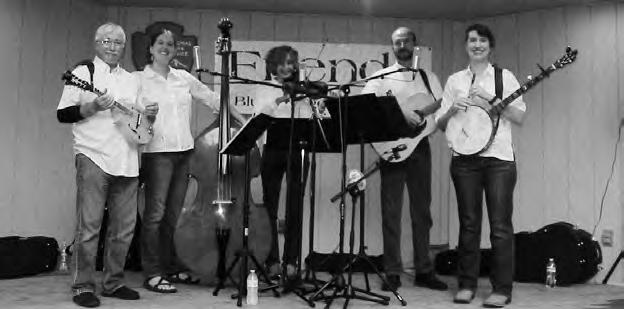
Thesis parade with bicycles!
2007
Happy news from Christine Lewis : “McCall Acton Lewis-Selvaggio was born on September 21, 2022. We are adapting to life as a family of four, and certainly appreciate that we’ve been able to visit with friends and family to a degree that wasn’t possible when big brother Carrick was born in the summer of 2020.”
And more happy news from Tina Sohaili-Korbonits: “My husband Alex Sohaili-Korbonits and I are thrilled to announce that our daughter (and potential future Reedie/Maroon), Maryam Mahdokht Sohaili-Korbonits, was born this January. She was named for the Persian mathematician Maryam Mirzakhani and my beloved grandmother Mahdokht Rayati. So far, she loves gazing at highcontrast art by Mondrian and listening to the Critique of Pure Reason by Kant. She has brought so much joy to our lives during the few months she’s been here, and we are excited for everything to come!”
2008 15TH REUNION
Reed College refuses to return U.S. News and World Report survey for 13th consecutive year.
2009
Happy Seventh Annual Nitrogen Day!
2010
Arianne (Rivard) Ekinci started a new job as a foreign service officer in 2023
and expects to earn a PhD in global/Asian history later this year.
2011
Happy 100th birthday to our favorite alma mater, who doesn’t look a day over 98!
2012
Don Berg’s Schooling For Holistic Equity: How to Manage the Hidden Curriculum in K-12 has been recognized by the Independent Press Award program as a winner in the category of Psychiatry/Psychology and as a distinguished favorite in the category of Education. (See Reediana.)
2013 10TH REUNION
Nate Herrmann ’12 and Terra (Vleeshouwer-Neumann) Herrmann had a long-awaited wedding celebration after a small but legally binding ceremony in 2020. With the help of maid of honor Lauren Bedson ’11 , they created an escape-room-style puzzle for their guests to open a magical portal to reveal their wedding cake.
Composer John Andrew WilhiteHannisdal ’13 penned an opera written after a libretto by Norwegian dramatist
Finn Iunker, which premiered at the Norwegian National Opera in fall 2022. (See Reediana.)
2014
And your own 10th reunion is coming right up!
2015
Heather MacFarlane and Callen Christensen welcomed Ronan Martin MacFarlane to the world on January 30. Young Ronan is already getting involved in the Alaska political scene.


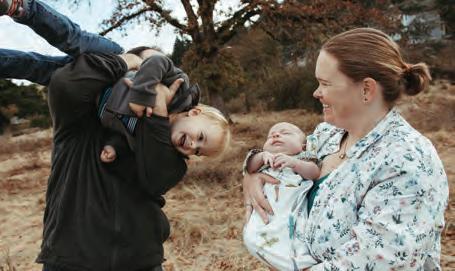
2016
On October 9, 2022, Hannah MacKenzie-Margulies got married to her partner of many years, Charles Gorczynski, in their adopted home of Minneapolis, Minnesota. Laini Szostkowski ’11 officiated, and Alanna Hoyman-Browe ’ 14 was one of their chuppah holders. “We actually met at Reed in 2013 at the opening of the Performing Arts Building. Prof. Morgan Luker [music] had contracted Charles’s band to play for the event and I was giving tours of the Performance Lab. We got to talking during
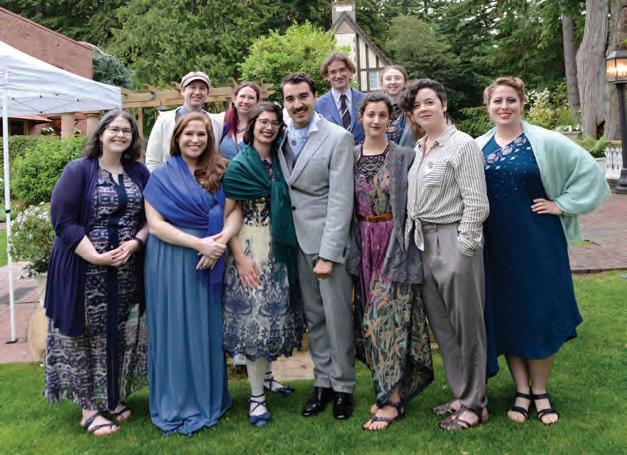
the cocktail hour and I guess you could say the rest is history.”
2017
Jonathan Kent Croom graduated In December 2022 with his Master of Industrial Design (MID) from Arizona State University, Tempe. Nicely done, Jonathan!
2018 5TH REUNION
Reed College refuses to return U.S. News and World Report survey for 24th consecutive year.
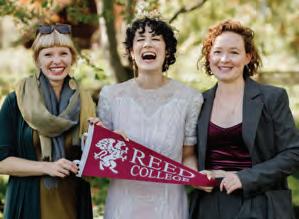
2019–20
Happy Seventh Annual Nitrogen Day!
2021
Lynette Yetter MALS followed up on her MALS thesis on Bolivian poet Adela Zamudio by translating more of Zamudio’s work and writing the translator’s introduction and afterword for the first book on the poet in English. (See Reediana.)
2022
And we’ll play you out to the sweet, sweet sounds of James Madison’s crystal flute.
clockwise from top-left
The Herrmanns finally got to celebrate their wedding! Front row, left to
Laura Klinkner ’16, Lauren Bedson ’11, bride Terra Herrmann ’13, groom Nate Herrmann ’12, Tess Myers ’13, Mica Peacock ’13, and Moriah Tobin ’11. Back row, left to right: Tiriel Gould ’12, Sarah Jablonski ’11, Christopher Vittal ’14, and Anna Henkin ’12.
Maryam Mahdokht
Sohaili-Korbonits, daughter of Tina Sohaili-Korbonits ’07
Left to
Laini Szostkowski ’11, Hannah MacKenzieMargulies ’16, and Alanna HoymanBrowe ’14 celebrate Hannah’s wedding and their alma mater.
McCall, a month old, in the arms of Christine Lewis ’07 during an outing to Canemah Bluff Nature Park in Oregon City, along with big brother Carrick and dad Michael.
Ronan Martin MacFarlane, offspring of Heather MacFarlane ’15, ponders Alaska politics..
right: right:Vivian Tomlinson Williams ’59
January 6, 2023, in Seattle, Washington, from amyotrophic lateral sclerosis (Lou Gehrig’s Disease). Dedicating her life to the study, preservation, and fostering of traditional folk music, Vivian made an inestimable impact on the bluegrass and traditional music of the Pacific Northwest. A marquee musician at bluegrass and old-time scenes, she made recordings of more than 300 fiddle tunes and was a prodigious historian of Northwest music. With her late husband, Phil Williams ’58 , she helped found the Seattle Folklore Society and the Northwest Folklife Festival.
Vivian began playing the violin when she was nine years old, and by her eighties had become an eight-time champion fiddler at the National Oldtime Fiddlers Contest and Festival. Bill Monroe, known as the father of bluegrass, said of her, “I have never heard a lady fiddler that could beat Williams, and a lot of male fiddlers can’t beat her.”

Vivian grew up in a home where music was important. Her parents met at a college in Berlin. Her mother, Jeanette, born to a Jewish family in Austria, married Warren Tomlinson, an American professor teaching at the college. After traveling to Minnesota to visit Warren’s parents, the newlyweds were discouraged by Jeanette’s relatives from returning to Hitler’s Germany. Warren took a job teaching German at the College (now University) of Puget Sound in Tacoma, Washington.
Vivian grew up in a home filled with international students coming to the house for teas, dances, and parties. She allowed that her childhood somewhat resembled the television show Happy Days, though not as much fun. Her early years were influenced by her father’s fiddle and harmonica playing and her mother’s love of gypsy violin music. Having learned to read before she started school, Vivian skipped the first grade, began playing the violin in the fourth grade, and was proud of her “Continental values.” She graduated as valedictorian of her class.
Her older sister, Barbara, started at Reed and loved it, but left after one semester. Influenced by Barbara’s regard for the college, Vivian applied, confident that campus social life would evidence none of the social conformity required at Stadium High School in Tacoma.
As a student at the Berliner Abendgymnasium, Vivian’s mother, Jeanette, had earned
a reputation for always asking questions and wanting to know more. Students and faculty nicknamed her “Fräulein Ja Aber,” which means “Miss Yes But.”
“Mother was very proud of that,” Vivian said. “And I thought it was wonderful, too. So I kind of picked up on that attitude. Does that sound like Reed, or what? Question authority.”
Going to Reed, she said, was like going to heaven, and the social life was as good as the academics. “You could play all the Bach you wanted, and everybody thought it was cool.”
Her first day on campus, she was helping her new roommate move stuff from the trunk of the car into their room at Kerr. From his window in Westport, Phillip Williams spotted Vivian and came out to introduce himself, sparking a partnership that led to more than 60 years of making beautiful music together. “That was kind of cool,” she said. “I had never had anything like that in high school.”
The academics were a bit trickier. In high school, she’d written only one term paper and was daunted by the task of writing a paper a week until Prof. Warren Susman [history 1953–58] showed her the basics.
“Okay,” he told her, “you make a statement, and then you say a bunch of stuff that backs up the statement, and then you summarize.” Vivian
could manage that.
At Reed she played both orchestral and chamber music. Folk music enjoyed a resurgence in the late ’50s, and after seeing Pete Seeger in concert, Vivian and Phil began hosting little hootenannies, where people came and sang folk songs. She played the guitar, the banjo, and a mandolin she had purchased for a dollar at the Salvation Army—she and Phil had begun treasure hunting at thrift stores. They once paid 25 cents each for what they thought were two Indian baskets at a Tacoma Goodwill store. One of Vivian’s favorite classes was taught by Prof. David French [anthropology and linguistics 1947–88], and she took the “baskets” to him and asked what they were. It turned out they were exceedingly rare, museum-quality Northwest Indian hats. The experience further kindled her desire to study anthropology, though she felt it was too late to switch her major. Her mentor at Reed was Prof. Dorothy Johansen ’33 [history 1934–84], whom she credited with giving her the training she would use to research and document Northwest music and dance traditions. Vivian wrote her thesis on American explorer John Charles Frémont, advised by Prof. Reginald Arragon [history 1923–74]. She went on to the University of Washington to earn a master’s degree in anthropology/ethnomusicology,
focusing on Northwest Native American music, and completed the coursework and language requirements for her PhD, but became distracted by playing music.
The summer after graduating from Reed, she married Phil and soon after began playing the fiddle. They moved to Seattle to go to graduate school and managed an apartment house owned by Phil’s dad. One day they listened to a record of Mike Seeger and his family.
“He was playing a tune called ‘Old Molly Hare’ on fiddle,” she recalled. “I listened to that and thought, ‘That’s kind of cool, I could do that.’ So I started messing around on the fiddle and then the next tune I learned was ‘Orange Blossom Special.’ I got hooked pretty fast.”
The bluegrass and old-time Southern music she began playing evolved into specializing in Northwest regional styles, 19th-century ballroom music, and the pioneer music of the American Northwest. She and Phil (who was a lawyer by day) formed a string band with a friend, Mike Nelson, who played the guitar and sang. The spare room in their apartment became a crash pad for traveling folkies, further anchoring the couple in the scene. At an open mic in a Seattle coffee house they met Ron Ginther, a mandolin player who asked if he could join them because he’d always wanted to be in “a hillbilly band.” The act was a hit, and the four formed a band called the Turkey Pluckers, playing at square dances and coffee houses and on television and radio. As her musical career advanced, the academics were moved to the back burner; Vivian was too busy playing music and hosting hippies.
Four years later, she helped form a strictly bluegrass band, Tall Timber. Vivian and Phil began backing up visiting bluegrass musicians and, in 1965, were instrumental in forming the Washington Old Time Fiddlers Association. The following year, along with fellow Reedies John Ullman ’65 and Irene Namkung ’65, they set out to recreate in Seattle the rich traditional music scene they’d enjoyed at Reed. Asking 20 people to donate $20 each, they created the Seattle Folklore Society, and, to their surprise, sold out their first show. This led to the founding in 1972 of the Northwest Folklife Festival, the largest participatory traditional arts festival in the U.S.
Developing their own musicianship, Vivian and Phil combined influences they found in corners of the rural Pacific Northwest with styles they’d learned growing up in the area. A friend introduced them to musicians from North Carolina, Tarheels who’d come to work in the Washington timber industry after World War II. Though Vivian could barely understand their dialect, the Carolinians took them in, and the experience was life-changing.
In 1967, Vivian and Phil started Voyager Recordings and Publications, issuing recordings, tune books, and instructional materials of traditional acoustic fiddle and string band music from
the Pacific Northwest and throughout North America. The label began as a kind of accident after they went to fiddle contests in Montana and Idaho.
“There were all these amazing jam sessions,” Vivian said. “Phil was just running around, carrying his tape recorder and recording everything.” When the couple got back to Seattle and listened to the tapes, they realized they had a trove of music that wasn’t being recorded anywhere else—most of the traditional music labels had gone to Appalachia. Their label emphasized the Pacific Northwest and Far West of North America, capturing the performances of more than 100 fiddlers. The couple also recorded with their bluegrass band, Tall Timber, and as a duo. The CDs they produced were labors of love, often taking years to break even. Many of the gigs they played outside Seattle didn’t even cover their gas money.
One album, Dance Music of the Oregon Trail, featured songs that had traveled west with pioneers, passed down from generation to generation. Another featured Music of the Lewis and Clark Exposition
“Nobody knows what tunes they played at the Lewis and Clark Exposition,” Vivian said, “but they had two fiddlers. Phil and I argued a lot about this, because the whole thing about Reed is you go to primary sources. You don’t just take somebody’s word for something. If primary sources don’t tell you the tunes, what business do you have guessing what they might be? But we did anyway.”
When she wasn’t playing or teaching music, Vivian was sewing quilts that won blue ribbons at the Puyallup Fair, working in her garden, or doing the New York Times crossword puzzle.
The Voyager catalog, including Dance Music of the Oregon Trail; The Peter Beemer Manuscript, a rare book of 1860s Idaho dance tunes; and The Haynes Family Manuscript, a collection of tunes from Oregon’s Willamette Valley, was acquired by Smithsonian Folkways.
Phil died in 2017. Vivian is survived by her sister, Barbara Tomlinson, and her niece, Shana Iverson.
June 8, 2022, in Cambridge, Massachusetts, from a long-lasting coronavirus infection. A giant among economists, Dale conducted groundbreaking research on information technology and economic growth, energy and the environment, tax policy and investment behavior, and applied econometrics. He was the Samuel W. Morris University Professor Emeritus at Harvard University, and, as Harvard said of him, “sits comfortably in the pantheon of Harvard’s greatest economists.”
A common theme in Dale’s work was the adaptation of cutting-edge econometrics to the realities of the available data while solving important real-world problems.
Born in Bozeman, Montana, he attended public schools in Helena. He was a George F. Baker Scholar at Reed, where he wrote his thesis, “Location Theory and the Hypothesis of Metropolitan Dominance,” advised by Prof. Carl Stevens [economics 1954–90]. After receiving his PhD from Harvard, he began teaching at UC Berkeley, becoming a full professor in just four years at the age of 30. Berkeley was the leading economics department in the creation of advanced mathematical methods of equilibrium theory and their implications for economic measurement. In the hands of Dale and others, the marriage of these ideas and techniques was infused into the curriculum from the beginning of the PhD program.
By the late ’60s, the Harvard economics department realized it needed to join Berkeley at the forefront of these advances. Under the guidance of former Berkeley faculty members Richard Caves and Henry Rosovsky, two department chairs who themselves had moved from Berkeley to Cambridge, Dale was recruited by Harvard in 1969 and became the Frederic Eaton Abbe Professor of Economics.
Along with the hiring of other academic superstars, Dale’s arrival marked the beginning of a renaissance in Harvard economics. He brought the Berkeley first-year theory course with him, and it became a hallmark of Harvard’s program. He also played a leading role in Harvard’s econometrics training. In 2002, he was named a University Professor, Harvard’s highest faculty honor. He directed the program on technology and economic policy at the Kennedy School of Government and served as chairman of the Department of Economics from 1994 to 1997.
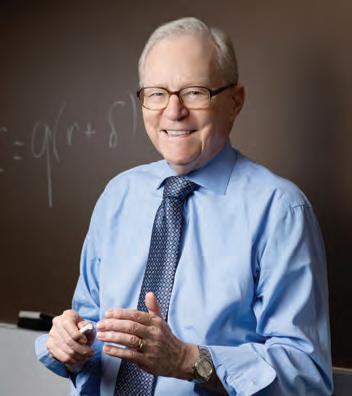
The focus of Dale’s applied work evolved over the ensuing decades, touching many areas of application, but its hallmark remained the integration of economic theory and econometrics, both at the highest level.
He authored nearly 300 articles in economics and was the author and/or editor of 24 books. His collected papers have been published in 10
volumes by the MIT Press, including Economic Growth in the Information Age (2002), which was the first major effort to quantify the impact of information technology on the U.S. economy.
In 1971, Dale received the John Bates Clark Medal of the American Economic Association, awarded every two years to an economist under the age of 40 for excellence in economic research. The citation read: “Dale has left his mark with great distinction on pure economic theory with, for example, his work on the growth of a dual economy, and equally on statistical method (with, for example, his development of estimation methods for rational distributed lags). But he is preeminently a master of the territory between economics and statistics, where both have to be applied to the study of concrete problems. His prolonged exploration of the determinants of investment spending, whatever its ultimate lessons, will certainly stand as one of the finest examples in the marriage of theory and practice in economics.”
Dale served as president of the American Economic Association and was named a Distinguished Fellow of the association. He was a founding member of the Board on Science, Technology, and Economic Policy of the National Research Council, and served as chairman of the board. He also served as chairman of Section 54, Economic Sciences, of the National Academy of Sciences and was president of the Econometric Society.
He was honored with membership in the American Philosophical Society, the Royal Swedish Academy of Sciences, the U.S. National Academy of Sciences, and the American Academy of Arts and Sciences. He was elected to fellowship in the American Association for the Advancement of Science, the American Statistical Association, and the Econometric Society, and was awarded honorary doctorates by Uppsala University, the University of Oslo, Keio University, and the University of Mannheim.
Generous in his support of Reed, Dale helped to fund the Reed College Science Research Fellowship, created through the generosity of Reed alumni elected members of the National Academy of Sciences in recognition of their distinguished and continuing achievements in original scientific research. In 1986, he delivered the Walter Krause Lecture, which brings visitors to Reed to lecture on matters of public policy and/or international economics to the Griffin Society.
He is survived by his wife, generous supporter of Reed Linda Mubus, and two children, Eric and Kari.
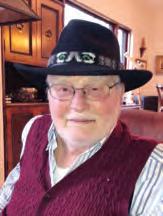
October 15, 2019, in Tuckahoe, New York.
The daughter of Sueyoshi and Taka Imai, Midori grew up in Portland and earned a bachelor’s degree in chemistry from Reed. She married
George Oller and, during the ’50s, was employed as a chemist by Merck and Company. She resided in Franklin Park, New Jersey, for many years and was a longtime congregant at St. Augustine of Canterbury Church.
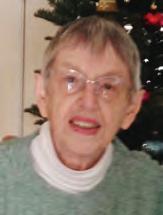
Rae Galbraith Ballard ’48
September 16, 2022, in Bend, Oregon.
CONTRIBUTED BY LAUREL BALLARD FISHKIN. Rae Elizabeth Galbraith Ballard was a beautiful soul. She was very smart, having graduated Phi Beta Kappa from Reed at a time when many women (not Reedies!), if they went to college at all, were there just to get an “Mrs.” degree. She was dedicated and persistent, taking two decades to finish her PhD, the pursuit having been put on pause while she married Charles Ballard and raised two children. But she was tenacious, teaching for a semester, then taking graduate courses for a semester, and eventually typing her doctoral thesis in a camping trailer while she and Chuck volunteered as camp hosts during summers at Jedediah Smith Campground.
Rae was artistic and creative, applying her talents to silk screening, calligraphy, jewelry making, and fabric arts, as well as other media. She was a poet, with several published pieces, and both a participant in and a teacher of poetry workshops. She loved the printed word and always surrounded herself with books, with Chuck scrambling to build more and more shelves to keep up.
She was a wonderful wife, mother, and grandmother, a fierce mamma bear, and a passionate advocate for friends, family, and colleagues. Eventually she was appointed the chair of the English and foreign languages department at Pasadena City College. Rae was an educator who loved to learn and expand her horizons. She was ahead of her time.
Sadly, after 68 years of (very happy) marriage, when Chuck died in January 2020, she found herself living alone for the first time. When the pandemic plunged her into total isolation only two months later, Rae became untethered, and her children moved her back to Oregon so daughter Laurie could manage her care. There she had the joy of seeing grandson Daniel Fishkin ’22 graduate from Reed last May, his senior thesis on the ethics of hospice having been dedicated to her.
November 16, 2022, in Portland, from congestive heart failure. Though not a superstitious man, Fred liked to point out that he was born in the year of the rabbit—August 29, 1927, to be exact—and that luck had smiled on him all his life. A strong case could be made that he was right. For starters, he was
adopted from Holy Cross Hospital in Spokane, Washington, by Silas and Myrtle Matthies, a prosperous couple from the area. They loved Fred as if he were their own, and he had no idea he’d been adopted until he was an adult. It is said that adopting a child can improve the odds of conceiving one, and sure enough, Fred was blessed with a little brother named Si in 1930.
The following year, the family moved to Ogden, Utah, where, despite the country’s severe economic woes, Fred spent a mostly idyllic youth playing baseball, hunting, and getting into mischief with his brother. He also developed a keen interest in astronomy, and it would become a favorite hobby, along with golf, for decades to follow. Fred was in high school when WWII broke out. A number of fine young men in the classes immediately preceding his were killed in action, but by the time Fred graduated from Ogden High School and reported for duty at the naval base in San Diego, the war was all but over. Lucky, indeed.
At Reed, Fred wrote his thesis, “A Study of the Application of Radioautographic Techniques to the Problem of Uptake, Transport, and Distribution of Materials by Cells,” advised by Prof. Frank Hungate [biology 1946–52]. “I learned to work hard and how to keep learning out of the classroom,” Fred said of his years at Reed. He completed his MD at the University of Chicago, and from there it was back to Ogden, where he joined the practice of Frank Bartlett and his son Jay Bartlett. Fred always said he was very lucky to start his career with a mentor as wise as the elder Bartlett, who emphasized the importance of humanity in medicine.
In 1955, he married the young widow Claire Shaw, adopting her two sons, Alan and Rich, and two daughters, Lynne and Janet. A third daughter, Karen, was born to the couple in January of 1957. Ultimately the marriage did not work out, but as luck would have it, a few years later he met Susan Arentz when they were introduced by a mutual friend at a party in Salt Lake City. They wed in June of 1969, just in time to watch the lunar landing together. A year later their son, Silas, was born while Fred was completing his residency in pediatrics at Stanford. The other residents said that, of their class, he was the kindest and most patient with ailing children.
Fred was working as a pediatrician in East Lansing, Michigan, when Susan gave birth to their second son, Carl, who was lucky enough to share his father’s birthday.
The bulk of Fred’s career was spent training residents at the Family Health Center, a clinic serving lower-income residents in Carson, California. The clinic was often under threat of closure because his bosses at UCLA saw lucrative
specialization, not general practice and primary care, as the future of medicine. Through it all, Fred would say how lucky he was to be able to take care of the sick and to work with dedicated colleagues committed to the same goal, rewards which far exceeded any financial compensation and more than made up for the slings and arrows from powerful administrators. Ultimately his vision of preventive health-care and the concept of a “medical home” prevailed, and the HarborUCLA Family Health Center is thriving.
Fred was an astronomy buff. Asked whether he was an astrologer, he replied, “No, just a stargazer.” He witnessed two full solar eclipses, an appearance of Halley’s comet, and a transit of Venus. He is survived by his wife of 53 years, his brother, three sons, and two daughters.
January 25, 2023, in South Yarmouth, Massachusetts.

Allen was born in Cleveland, Ohio, and educated at the Putney School in Vermont. At Reed, he wrote his thesis, “The Comic Vision of Christopher Fry,” advised by Prof. William Alderson [English 1943–64], and then went on to Harvard Business School for a year. He entered the U.S. Navy as an officer and was stationed in Naples, Italy, from 1955 to 1957, where he claimed to have survived attempts on his life by an organized crime syndicate that took umbrage at his inspection of goods shipped through the harbor.
In Italy, he met Chicago native Gloria Scala, who became his first wife, and they had two children. He later met and married food author Irena Chalmers, and they made a home in Port Washington, New York.
Allen enjoyed a long and fruitful career in publishing, including stints as editor and executive at Doubleday and Company, Macmillan Publishers, and American Heritage. In 1974, he established Allen D. Bragdon Publishers, which he ran from his Upper West Side home in Manhattan. One of his early projects was Family Creative Workshop, a 24-volume craft encyclopedia for Time-Life Books, which found its way to families across the country and continues to inspire home craft projects to this day. His Brownstone Library imprint, inspired by the location of his publishing house, included many cooking and crafts titles featured as main selections of book clubs such as Better Homes & Gardens and Book of the Month. During his long career in publishing, Allen created an eclectic array of books and materials on varied subjects including craft, food, how-to, fairy tales, baby clothes, and the brain.
In the late 1980s, he moved his publishing company to his family home on the Bass River
in Cape Cod, Massachusetts, where he collaborated with Field Enterprises on a multiyear card and binder series sold by subscription to craft hobbyists all over the country. The financial success of this collaboration allowed him to branch out in new directions inspired by his own interests and whims, including Ingenious Inventions of Domestic Utility, which landed him on the David Letterman show in 1990. During this period, he teamed up with David Gamon ’84 to form the Brainwaves Center on Cape Cod. They embarked on a series of books presenting insights from the world of brain research to the lay person, starting with Building Mental Muscle (published by Barnes & Noble) and continuing with half a dozen other titles under the Brainwaves Books imprint.
Allen had a knack for not only dreaming up ideas for books but also mastering the technical details of their subject matter and working in close collaboration with their authors, designers, and editors to shepherd them through the production process. Most importantly, he had a strong faith in the innate skill, creativity, and dignity of ordinary folks and a belief in the importance of respecting his audience by ensuring the workability and authenticity of everything that went into his books.
Along with other sporting activities, Allen was an avid mountain biker and often rode his bike to work in Manhattan—long before it was fashionable. On a ride through the mountainous heart of Tuscany, he came upon a medieval “castello” and spent five years renovating the four-story home, after which he split his time between Tuscany and Cape Cod.
A passionate sailor, Allen was very involved in the New England Beetle Cat Boat Association and the Bass River Yacht Club, where he held the position of commodore. He was known by his walking stick with the head of Giuseppe Verdi, his favorite composer.
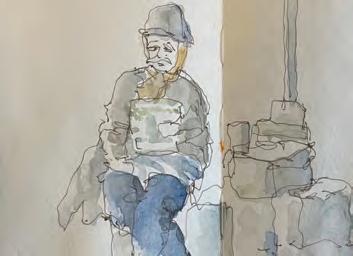
He is survived by his two children, Allen Clifford Bragdon and Sara Capstick.
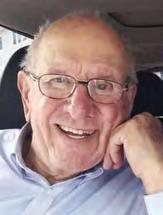
Jeremy
December 2, 2022, in Berkeley, California.
Honor
This story, written by Alistair Boone, was originally copublished in Street Spirit and Berkeleyside ILLUSTRATION BY EDDIE CHAU Jeremy Jeremy—the beloved Berkeley Street Spirit vendor who sold the newspaper on the corner of College Avenue and Russell Streetnearly every day for 10 years—died on Dec. 2. He was 85 years old.
“It’s been kind of remarkable, the impact he had on all of us,” said Kara Hammond, the owner of Baker & Commons, the cafe on the corner of College and Russell “We are a busy cafe, with 300 people coming in and out per day on the weekend. Even if people didn’t talk to him, he was always there, his presence was there. They saw him, and maybe quietly observed his condition, what was going on with him. In that way you can feel the loss in the community, in the fact that that person was always there and now he’s gone.”
According to his friends and patrons, Jeremy grew up in Seattle in a radical, leftist family. His father was a member of the Communist Party and worked as a labor rights attorney, his grandfather was a Methodist minister, and his greatgrandfather was a colonel in the Union Army, recruiting fellow Missourians to fight for the North. Around the age of 10 he worked as a paperboy, delivering newspapers to the forested outskirts of Seattle, and developed a love for the greenery and animal life in the area. As a teenager he spent several summers working at a salmon cannery in Bristol Bay, off the coast of Alaska. He began his undergraduate study at Reed College, where he studied for several years before transferring to the University of Washington in Seattle, where he studied biology and zoology, and then pursued a PhD in biology.
As a socialist and a graduate student assistant in the 1950s, he often found himself appalled by the political views of his peers. He ultimately quit his studies and became involved with Trotskyist party politics and then the Spartacist League— which, inspired by Marx and Engels, pledged itself to “the dictatorship of the proletariat,” believing that workers should control the means of production. In the ’60s, he traveled to Chicago for a Spartacist rally. Afterward, several of his rally companions were continuing on to Berkeley, and he decided to go with them. He arrived in the late ’60s and stayed for the rest of his life.
“He was just so cool. I just loved talking with him,” said Sadie Radinsky, a junior at UC Berkeley and a patron of Baker & Commons who became close to Jeremy, often buying him groceries and bringing him food. Radinsky spent hours standing and talking with Jeremy after class, discussing the subjects she was studying, current events, and world politics. He had an encyclopedic memory, and could speak in depth, she said, on just about any subject. He always remembered her class schedule and would check in about how certain courses were going. When she was studying the Haitian revolution, he shared his thoughts, having taught himself Creole for fun as a young man by checking tapes out of the library. “He was always educating himself, and I think that curiosity and desire to keep learning is what formed his politics,” Radinsky said. “I
swear to god, I learned more about things from him than my classes.”
Jeremy started selling Street Spirit on September 26, 2012. During his 10 years on the corner of College and Russell, he became a staple of the Elmwood neighborhood, befriending patrons of Baker & Commons and quietly observing life on the corner each day. He was dedicated to his post, as if he took it upon himself to contribute to the neighborhood.
“He would say, ‘I’m sorry I’m late today,’ almost like we had a professional relationship,” Kara Hammond remembers. “He always called it his work, like, he was having a busy day at work. We would often compare notes, and ask each other, ‘Has it been busy for you? No, it’s not busy for us either, where is everybody?!’”
Many have described Jeremy as calm, curious, intelligent, and kind. In the early days, he tutored Cal students in the cafe. He loved to talk to those who stopped to chat, but did not force his presence—except for in moments of injustice. In 2017, he was sitting in his spot when a disheveled man appeared out of nowhere and began shouting homophobic slurs at a lesbian couple standing in line at the cafe. Jeremy got in front of the man and interrupted him by yelling “Hey,” according to a story in Berkeleyside. The man hit him in the face, knocking Jeremy to the ground and running away. Afterward the family bought Jeremy lunch, and the cafe gave him a free hot chocolate.
“I felt like he was breaking down preconceived notions and judgments in his very existence because he was so kind,” Radinsky said. “He offered a little window into the hearts [of unhoused people]. He reminded us that just because someone is hanging out on the street, doesn’t mean anything about the person. We can talk, and they can become part of our community more. I think he gave that to so many people.”
Jeremy was not unhoused, but he lived below the poverty line and often worried about whether or not he would be able to pay rent in his subsidized Berkeley apartment. He collected disability for injuries he sustained during his time at the salmon cannery, and sold Street Spirit to make ends meet. During the final years of his life, he feared that he would not be able to remain housed after the COVID eviction moratorium ended, a scenario he did not face before he died. He was buoyed by the generosity of his customers—the coffee and biscuit with butter he got every day from the staff at Baker & Commons, the groceries purchased for him by people like Radinsky, and the meals that others would share with him, buying him lunch and sitting down together to eat. In return, he gave back in his own way, with his calm demeanor, the twinkle in his eye, and the sense of community he brought to the corner each day.
Following his death, there was an outpouring of appreciation for Jeremy on the corner of College and Russell. A bouquet of flowers
adorned a chair where he used to sit, and Radinsky wrote a short obituary on a watercolor poster board. One patron brought a succulent into the cafe in memory of him, and many have stopped by to talk about Jeremy and why they will miss him. One afternoon, Radinsky watched two young boys approach the memorial plaque and quietly place a quarter on the crate where he used to stack his newspapers before bowing and walking away.
Jeremy had a big heart and often despaired about events in the news, such as the war in Ukraine, the oppression of poor people and Black Americans in particular, and the dominance of American capitalism around the world. He was distraught over the creeping sensation that history is repeating itself, and that the atrocities he witnessed when he was young—such as racism, oppression, and war—were coming around again. But his big heart and his fierce sense of justice illuminated his street corner, making the world a little brighter for those he met and those who simply passed by him, day after day.
“It will be so different here, I think it will feel empty,” Radinsky said. “I spend so much time on this street and I love the community energy. I feel like he was a huge part of that.”
December 5, 2022, in Portland, at home. Margaret was born in Pocatello, Idaho, and was one of four valedictorians graduating in her Pocatello High School class. She attended Reed, majored in Russian, and wrote her thesis, “Yuri Zhivago in the ‘Superfluous Man’ Tradition,” advised by Prof. Vera K. Krivoshein [Russian 1949–72]. Two years later, she received her master of arts in teaching from Reed. While at Reed, she met David Mesirow, whom she married in 1962. They were married for 52 years, until his passing in 2014.
She taught language arts and Russian at Cleveland High School in Portland. In 1972, she began working for the Kobos Company, and eventually became its human resources manager. After she retired, her passion for
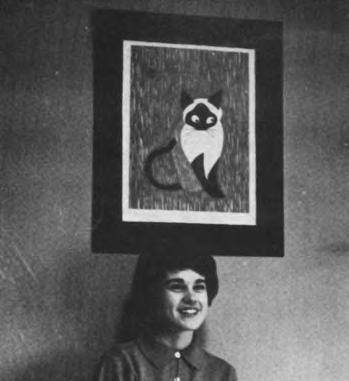
education inspired her to volunteer at Beach Elementary School for 14 years. Margaret had a sharp wit and a keen intellect. Not only was she an excellent listener, she had a strong moral compass. She never forgot where she came from and lived her life in accordance with the strong values and sense of self she gained while growing up in Pocatello. She was an avid reader, enjoyed listening to West Coast jazz and gardening, and was a meticulous record keeper.
She is survived by her daughter, Catherine Mesirow, and son, Nicholas Mesirow.
December 18, 2022, in Newport, Rhode Island. Ron was born in Rochester, New York, and grew up in Los Angeles. At Reed, he wrote his thesis, “An Examination of the Properties of the Dominant Characteristic Value of a Non-Negative Square Matrix,” advised by Prof. Burrowes Hunt [math 1953–77].
When Ron decided he didn’t want to become an academic, an uncle in the insurance business directed him to a job as an actuary. Ron worked briefly for Occidental Life in Los Angeles before moving to Boston. A member of the Society of Actuaries and the American Academy of Actuaries, he ended his career with Metropolitan Life after the merger of the two companies. While he was at New England Life, he met his wife, Johanna, who was also an actuary at the company.
After retiring, Ron moved to Newport, where he served as copresident and treasurer of the Alliance for a Livable Newport and as a member of the city’s Trust and Investment Commission. He supported the Edward King House senior center, helping to start its Circle of Scholars program, and was cofacilitator of its international current events course. Ron was a member of the Boston branch of the International Wine & Food Society and a member of the Chaine des Rotisseurs.
He is survived by his wife of 52 years, Johanna, his daughter, Jessica Cooperman, and his sister, Ilene Cohen.
October 20, 2022, in Boulder, Colorado.
Born in Vancouver, Washington, Fred was drawn to the sciences at an early age with dreams of helping fuel the glory of the space race. As a child he conducted many advanced science experiments and entered regional and national science fairs. When he was 13, he won the
Northwest Science Exposition with an exhibit demonstrating the basic propulsion system of the Vanguard project, which was intended to launch the first artificial satellite into low Earth orbit using a Vanguard rocket.
At the age of 17, he built a Van de Graaff proton accelerator in his bedroom, which earned him a finalist spot in the National Science Exposition and the honor of a sponsored trip to Washington, D.C., to meet President John F. Kennedy.
Following high school, Fred was accepted to numerous colleges, including Caltech and the University of Washington, but chose Reed, the first in his family to attend higher education. While studying physics at Reed, he met his future wife, Karen Herndon ’66. He wrote his thesis, “Photo Stimulation of Si-SiO₂ Interface States,” advised by Prof. Jean Delord [physics 1950–88].
Fred began a PhD program in atmospheric physics at the University of Nevada, Reno, where he studied under and later worked in close partnership with his mentor, pioneering physicist Patrick Squires. Fred and Karen married in 1967 and had two sons, Jason and Devon.
After completing his doctoral dissertation in 1977, Fred worked until retirement at the Atmospheric Sciences Center Desert Research Institute (DRI), a division of the University of Nevada, Reno (UNR), as an aerosol physicist studying climate change and air pollution. He also taught graduate courses in atmospheric physics at the university and was a committee member for many PhD students.

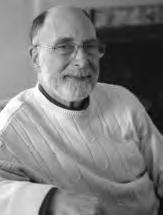
Extremely humble by nature, he usually chose to be listed as “Fred Rogers” versus his full name and accreditations in the many scientific journal articles he authored or coauthored, and habitually put students’ names ahead of his. He often told people he was a plumber (a profession he carried great respect for). Fred chose to live simply, drive old, cheap cars, and save money for family and travel.
In 1978, he went to Galway, Ireland, to work with colleagues at University College Galway (now the University of Galway). This sparked a love for all things Irish; he returned in 1979 with his entire family. His affinity for Ireland endured; he continued working with the physics group in Galway and was able to attend many professional conferences there during his long career. He loved Irish culture and history, especially traditional Irish music.
In the 1980s, he met and eventually married his second wife, Penny Royce, and stayed deeply in love and devoted for the rest of his life. Prior to retirement, Fred conducted research and teaching sabbaticals at NASA Ames Research Center in Sunnyvale, California, and UC Berkeley. He retired from UNR/DRI in 2003. After retirement, Fred and Penny traveled widely in Europe, where they especially enjoyed the south of France.
Incredibly kind and generous by nature, Fred believed deeply in social justice and LGBT and
racial minority rights, and loved meeting and talking with strangers. Throughout his life Fred valued science, learning, and education.
He is survived by his wife, Penny RoyceRogers, sons Jason Rogers and Devon Rogers, and stepdaughters Kristy Royce and Katie Royce-Salazar.
September 19, 2022, in Portland.
A Portland native, George attended St. Lawrence Grade School, Central Catholic High School, and the University of Portland, where he earned both his bachelor’s degree and a master’s in education. After his undergraduate studies, George entered active duty in the U.S. Air Force and served at the early warning radar base on Neah Bay, Washington. After 10 years with the air force reserves, he was honorably discharged with the rank of captain.
He met Ann Hilger at the University of Portland; they married in 1956 and raised four children. Both George and Ann were educators. George started teaching at La Center High School in Washington, and in the ’60s taught and was activities director at Portland’s Grant High School. In 1970, he got his MA from Reed, where he wrote his thesis, “Futility and Enlightenment in the Five Works of Ernest Hemingway,” advised by Prof. Howard Waskow [English 1964–72]. He became vice principal of discipline and curriculum at Lincoln High School and in 1980 was transferred to Roosevelt High School, where he retired as principal in 1993. George finished his career as adjunct professor of education at the University of Portland.
Throughout his career and retirement, George was committed to community and faith. After retiring from Roosevelt High School, he worked to develop a scholarship fund for girls at the school, which already had a similar fund for boys. He was on the board of the Peninsula Optimist Club, was a lifelong blood donor at the American Red Cross, and, as a devout Catholic, attended and supported Holy Redeemer Catholic Church for 65 years. Preceded in death by his wife, Ann, and his daughter, Margaret, George is survived by his sons, Rev. Anthony Galati, Joseph Galati, and Christopher Galati.
Conrad
March 2, 2023, in Denver, Colorado, after a short and sudden illness.
The eldest of four sons, Conrad grew up in McLean, Virginia, and attended Potomac School and Choate Rosemary Hall boarding school, where he excelled at soccer and visual arts. He spent a year in France as a high school student, learning French and memorably sporting an opera cape and smoking cigarettes in the balcony at the Paris Opera.
Conrad studied art at Reed, producing a thesis titled “Xerox Itself” under the guidance of Prof. Lewis Rakosky [art 1972–75]. After
graduating, he lived for two and a half years in Tokyo, where he tutored Japanese students in English, learned fluent Japanese, and played the game of Go, which he continued to play and study throughout his life. He maintained respectful friendships with prominent Japanese artists and architects and would later have a solo sculpture show in Tokyo at Gallery Te.
Following a stint fabricating and installing large-scale sculpture for artist Dennis Oppenheim in New York, Conrad moved to Santa Fe, where he resided for 40 years. A visionary and working architect who earned his MA in architecture from the University of New Mexico, Conrad was committed to designing architecture for the human body. His connection with contemporary art, sculpture, and dance spanned his lifetime.
Conrad had a particular fascination with the design of the never-finished Paolo Soleri Amphitheater in Santa Fe, and became an advocate when the structure was threatened with demolition. His research project into the history of the amphitheater played a lead role in 2016’s SITE Santa Fe biennial, with a gallery he designed constituting the show’s introductory room.
Conrad was profoundly influenced by his maternal grandmother, Mary Senior Churchill, with whom he spent much time as a boy and young man soaking in the cultural life of her home town of New York City. Henry Churchill, his maternal grandfather, was an architect and urban planner in New York and Philadelphia who designed and built the first Bauhausinspired skyscraper in Manhattan.
A lover of nature and physical activities, Conrad grew up camping in New York’s Adirondack Mountains and sailing under the tutelage of his father, Homer, an expert sailor and a naval architect with Quaker roots from a Massachusetts whaling family. Conrad’s accomplishments as a sailor developed during childhood summers in Marblehead, Massachusetts. He participated with his father and his brother Graham in the 1978 Marion to Bermuda Race aboard Homer’s beloved Hinckley Bermuda 40 yawl, Capella . Many family dinners included avid retellings of Bermuda races and boasts about winning a match race against Marblehead’s greatest sailmaker.
In New Mexico, Conrad and his wife Ellen Berkovitch hosted many gatherings of friends and family. The couple took up canoeing at the time they built their house in the mountains, and spent many a windy summer afternoon paddling on lakes and rivers. Conrad also excelled at backcountry skiing and swimming, and was lately devoted to ground training his horse, Uno. His lightning wit and legendary kindness will be missed by his many friends across New Mexico, back East, and abroad.
As a Soto/Rinzai Buddhist of the White Plum Asanga, Conrad took Jukai in December 2022, receiving the name “Uji,” usually translated as “Being-Time,” from Daishin Roshi. Conrad’s delight, curiosity, and dedication in Buddhist practice mirrored the delight, curiosity, and dedication he showed in his vocation and avocations.
Conrad is survived by his wife and best friend of 30 years, Ellen Berkovitch, and his brothers Henry, Graham, and Nathaniel Skinner. He is also survived by his cherished new friend, Amanda Proll.
Neil Talbot Jumonville ’77
September 8, 2022, in Tallahassee, Florida, following a five-year battle with Alzheimer’s. Neil was raised in the Council Crest neighborhood of Portland and graduated from Lincoln High School. After high school, he worked in a lumber mill and traveled around Europe for a few years. He began college at Pacific University and then transferred to Reed, where he wrote his thesis, “Market Socialism: The Theory and Its Critics,” advised by Profs. Peter Sinclair [economics 1976–77] and Maure Goldschmidt [political science 1935–81]. He received a fellowship to study history at Columbia and went on to receive another MA and his PhD from Harvard in American studies.
Florida State University offered him a teaching position, and he rose from assistant to full professor and then was named the William Warren Rogers Professor of History. He chaired the department from 2002 to 2008; a beloved classroom professor, he won teaching awards four separate years and was named Professor of the Year in 1995.
He said that at FSU he tried to employ “the best parts of the teaching philosophy at Reed... the benefits of intellectual and historical doubt. As Reed found, students rise to the level at which they are addressed and expected to perform. That is a lesson I try to follow.”
Neil’s main scholarship and publishing focused on mid-20th-century American intellectuals as cultural critics. His books include Critical Crossings: The New York Intellectuals in Postwar America (1991) and Henry Steele Commager: Midcentury Liberalism and the History of the Present (1999). In addition, he acted as editor and contributor to other books, and wrote journal articles, short essays, and reviews for journals and newspapers.
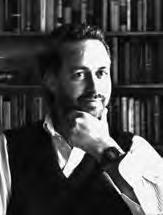
Neil believed the role of the intellectual was to persuade readers, to defend important ideas, and to write for the public and the civic good. Polyactive in university affairs, whether through committees or Thursday morning
basketball, Neil believed in serving his community. Family and friends will recall his commitment to hospitality, his sense of humor, and his sincere concern for others.
Neil is survived by his sisters, Penny Abrahamson and Anne Flaningam, and his brothers, Bill Jumonville and Robert Moore-Jumonville.
October 4, 2022, in Santa Fe, New Mexico.
Genevieve was born in Evanston, Illinois, and moved with her family to Albuquerque, New Mexico, when she was nine. Graduating from Manzano High School, she attended Reed, where she met Courtney White ’82 during orientation week of their freshman year. They were together for more than 40 years. She wrote her thesis, “Start the Revolutions without Me: Theoretical Advances in Modern American Archaeology,” advised by Prof. Claude Vaucher [anthropology 1963–94].
After earning a master’s degree from UCLA, Gen chose a career in archaeology and accepted a job in Santa Fe with the National Park Service as a researcher and project director. In 2008, she joined the New Mexico Department of Transportation’s Cultural Resources section, eventually becoming its tribal consultant specialist. Inspired by her children, Sterling and Olivia, she became active with the Upstart Crows, a youth Shakespeare troupe in Santa Fe. She loved her family, archaeology, New Mexico, and all things Shakespeare.
She is survived by her husband, Courtney White, and their children, Sterling White ’21 and Olivia White.
December 26, 2022 in Saanich, British Columbia, from cancer.
Born in Tehran, Iran, Ani grew up in the Pacific Northwest and earned her undergraduate degree at Reed before completing a master’s degree from OHSU and a master’s in social work and an MD from the University of Illinois. After completing her residency in family medicine at the University of Ottawa, she settled in Sudbury and Little Current, Ontario, as a rural family physician. With their growing family, she and her partner, Anthony Minniti, moved to Victoria, British Columbia, in 2009, where she took a job as a medical advisor at WorkSafeBC. Both as a doctor and as a researcher, Ani was treasured for her calm, compassionate care, her meticulous attention to detail, and her willingness to explore and push for new knowledge.
Ever curious, always learning, Ani savored life’s tastes, sounds, and stories (from sci-fi to classics to Lord of the Rings). She was a movie lover, inexhaustible researcher, lifelong musician, and passionate cook. On a typical night she might create a robust Persian dish, play violin with her daughters, and end the evening watching a Japanese anime film with her family.
Ani is survived by her life partner and
best friend, Anthony Minniti; her daughters, Beata and Ava Ariana-Minniti; and her sister Proochista Ariana.

February 5, 2023, in Portland, of a hemorrhage in his brain stem.
Born in Washington, D.C., Rob moved with his family to Baltimore County, Maryland, when he was 11. He attended Hereford High School, where he was deeply involved in the music and theatre departments. He studied music at Reed and for his senior thesis wrote and music directed a musical called One Hour in Eden, advised by Prof. Armando Bayolo [music 2002–04]. In 2007, he received an MA in music education from Portland State University.
Rob began his professional life music directing at summer camps in Maryland, traveling back nearly every year for the rest of his life. In Portland, he spent 16 years as the music director at Pioneer United Methodist Church in St. Johns, followed by a year as accompanist at Tualatin Methodist Church. At the time of his death, Rob was accompanying the Columbia Chorale of Oregon in St. Helens and Bel Canto at the University of Portland. Throughout his career he was involved with a wide variety of music groups, choirs, and musical theatre shows; notable productions included Parade, Cabaret, and Heathers. He also worked at Reed, both as a choral accompanist and in private instruction of accordion and musicianship.
At Reed, Rob met fellow music major Vera Alcorn ’06 , whom he dated when he was a senior and she was a freshman. They broke up but reunited nine years later and were married in summer 2019 in the Eliot Hall chapel.
Rob was an intelligent, intuitive, and collaborative musician. He strove to bring the best out of everyone he worked with, whether that was another seasoned professional, a high school student finding their voice, or a member of a small church choir. He was deeply and often subtly silly, cracking thoughtful jokes with precise timing. He approached every aspect of his life with intensity. Loved ones recall how, when having a conversation with Rob, his conversational partner got the full focus of his attention.
Rob is survived by his wife, Vera; his mother, Barb Fishel; and his brother, Matthew Fishel.
Doris Avshalomov ’43, Barbara Thompson ’43, Audrey Nixon Drawbaugh ‘44, Sylvia Davidson ’47, Stuart Crawford Gaul ’48, Marion Marx ’48, Phyllis Terkla ’48, Ruth Keller ’49, John Shipley ’49, Eleanor Carter Brome ’51, Willis Eldridge Sibley ’51, Chester Case ’52, Ruth Walby ’52, Thomas Burke ’55, Philip Tambling ’56, Joan Emerson ’57, Norman Linton ’58, Irene Janofsky Hartzell ’60, Janet Swanson ’60, Charles Pollack ’61, Raymond Baggs ’64, Nancy Wilmeth ’64, Jill Dubisch ’65, Bart Jones ’65, Alan Ackerman ’68, Emerson Mitchell ’71, Monica Mayper ’73, Erik Mutén ’77, Francis Varga ’79, Michael Groves ’80, Daniel Rankin ’06, Prof. Angela E. Ayres, Prof. Bertram Brehm, Prof. Frank Hungate, Gary Schlickeiser [staff]
Consider a gift to Reed in your estate plans to honor your past and provide for Reed’s future.
Consider a gift to Reed in your estate plans to honor your past and provide for Reed’s future.
The Eliot Society celebrates donors who make a gift to Reed in their estate or who establish a life income gift to benefit Reed. This tradition of generosity reaches back to Reed's roots—the college itself was established through a bequest from the estates of Simeon and Amanda Reed in 1908. The society is named for Thomas Lamb Eliot, who first suggested to Simeon and Amanda Reed that they use their financial resources to found an institution of learning in Portland.
The Eliot Society celebrates donors who make a gift to Reed in their estate or who establish a life income gift to benefit Reed. This tradition of generosity reaches back to Reed's roots—the college itself was established through a bequest from the estates of Simeon and Amanda Reed in 1908. The society is named for Thomas Lamb Eliot, who first suggested to Simeon and Amanda Reed that they use their financial resources to found an institution of learning in Portland.
If you’ve already made a gift to Reed in your will or trust, please let us know so we may thank you and welcome you into the Eliot Society.
If you’ve already made a gift to Reed in your will or trust, please let us know so we may thank you and welcome you into the Eliot Society.
Contact Kathy Saitas to learn more about including Reed in your legacy planning: 503-777-7573
giftplanning@reed.edu
Contact Kathy Saitas to learn more about including Reed in your legacy planning: 503-777-7573


reed.edu/legacyplanning
giftplanning@reed.edu
reed.edu/legacyplanning
“TREE PLANTING IS ALWAYS A UTOPIAN ENTERPRISE . . . A WAGER ON A FUTURE THE PLANTER DOESN'T NECESSARILY EXPECT TO WITNESS.”
MICHAEL POLLAN, A GARDENER'S EDUCATION
“TREE PLANTING IS ALWAYS A UTOPIAN ENTERPRISE . . . A WAGER ON A FUTURE THE PLANTER DOESN'T NECESSARILY EXPECT TO WITNESS.”
MICHAEL POLLAN, SECOND NATURE: A GARDENER'S EDUCATION
Zebrafish are freshwater fish that live in small streams and pools throughout India, Pakistan, Myanmar, and Nepal. Zebrafish are popular among fish hobbyists because they’re very easy to keep alive in small tanks of fresh water without much effort or expertise. These same principles and more make zebrafish especially well suited for biological investigations. Zebrafish lay hundreds of eggs at once (called a clutch) that, when fertilized, develop very rapidly. For example, a zebrafish eye

develops into an organ that can see within approximately three days. The same process takes nearly three weeks in mice and almost three months in humans. Moreover, because the zebrafish embryo is so small (about the size of a sesame seed), and develops outside of the mother and is nearly transparent, scientists can watch its development over time and gain unprecedented insights about cell behaviors in a living organism. In Biology
351L: Developmental Biology, as well as in my
research lab, we’re curious about how eyes and brains grow and develop. In particular, we want to identify and study the molecular and cellular cues that influence whether cells divide, differentiate into neurons, or die. We study these processes by using microscopes to capture photos and movies of developing zebrafish embryos, where we can label individual cells and groups of cells and watch what they do. —KARA CERVENY [BIOLOGY]

The Loyal Owl Society recognizes the steadfast support of alumni who give to Reed every year. Membership is conferred when alumni contribute to Reed for three consecutive years. In 2023, 2,387 alumni were Loyal Owl Society members.

“The world needs more Reedies, and I know my gift helps make that possible.”KATHERINE
LEFEVER ’07 |Alumni Fundraising for Reed Steering Committee co-chair
